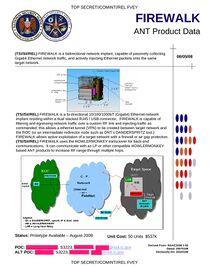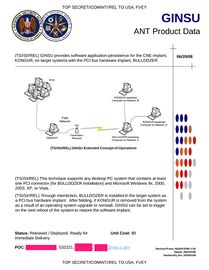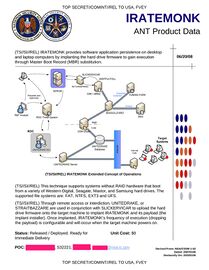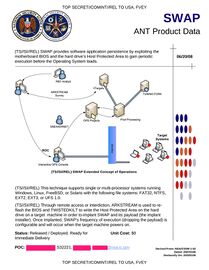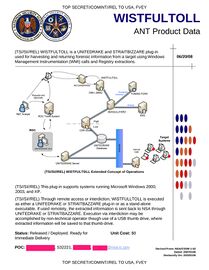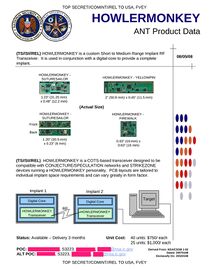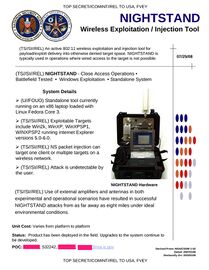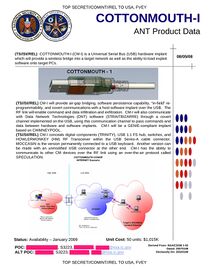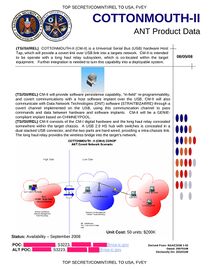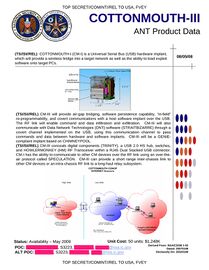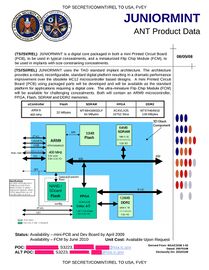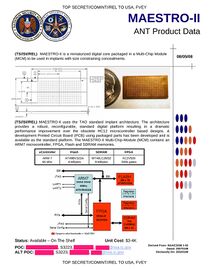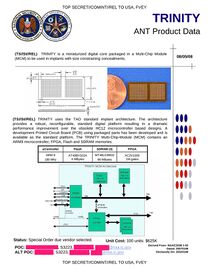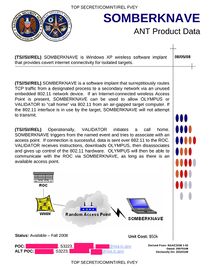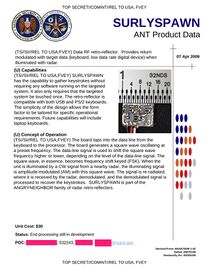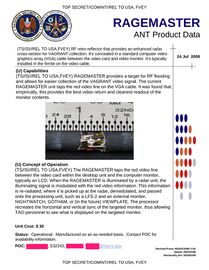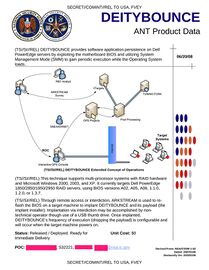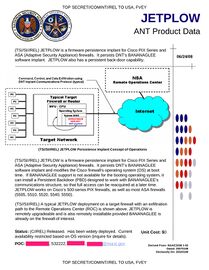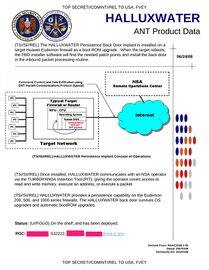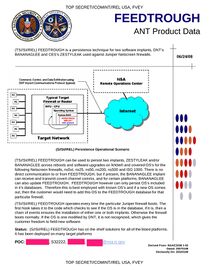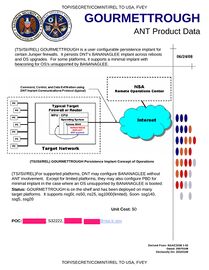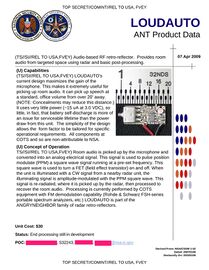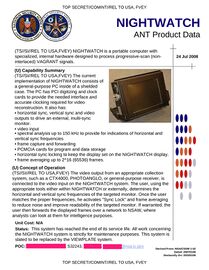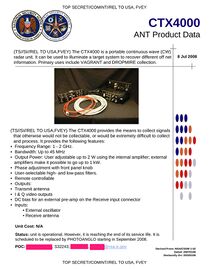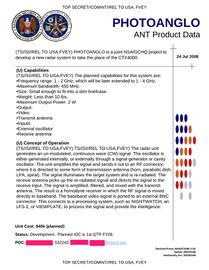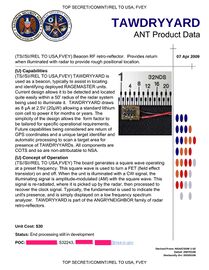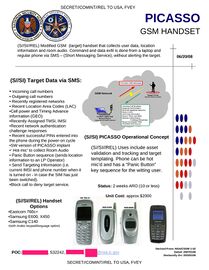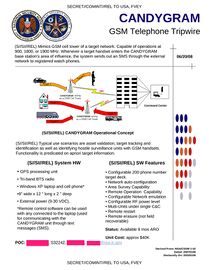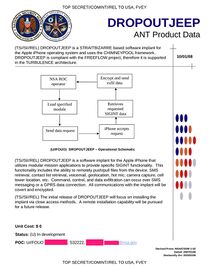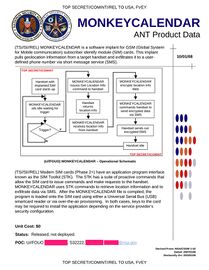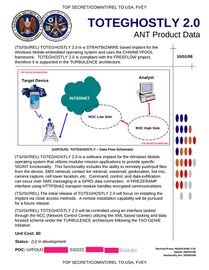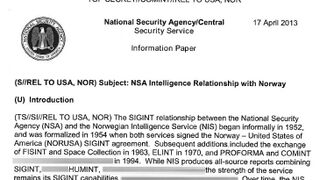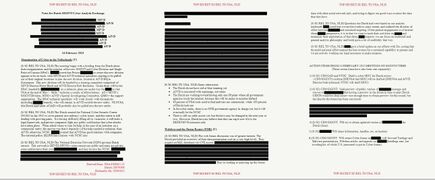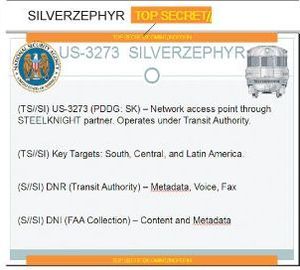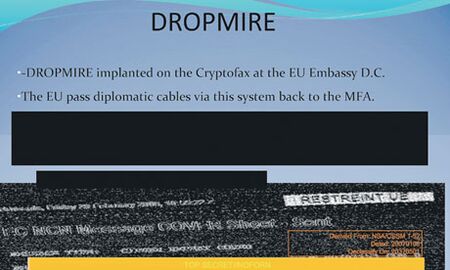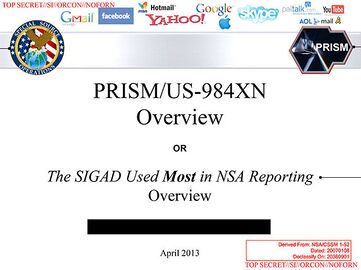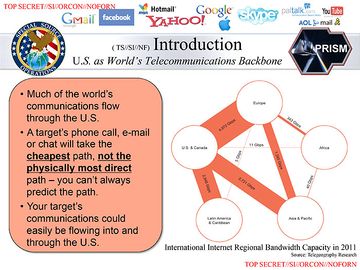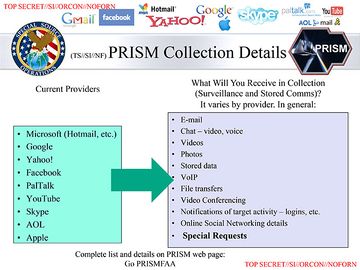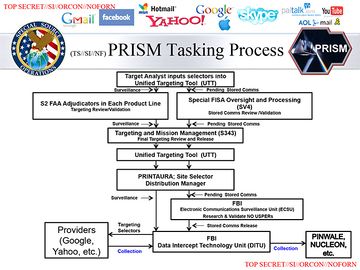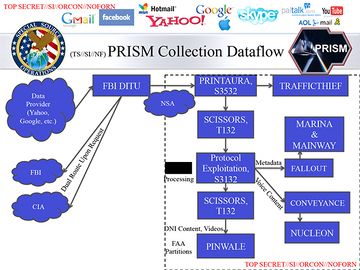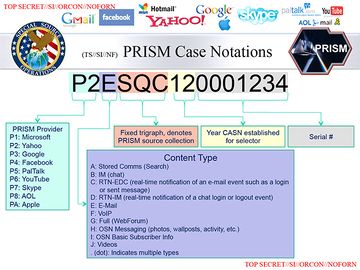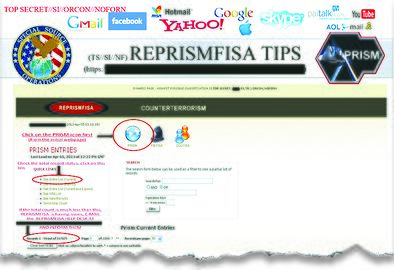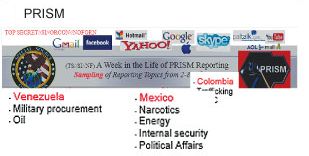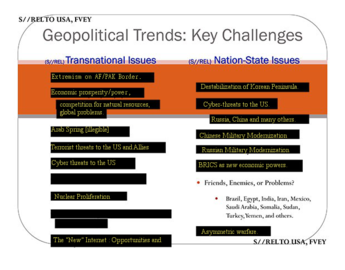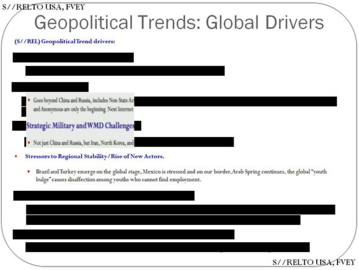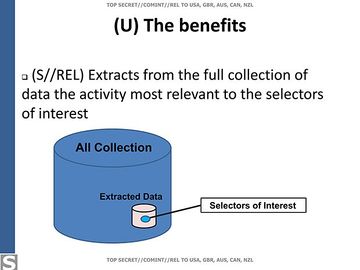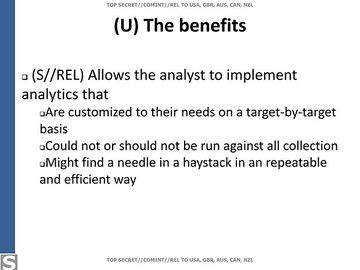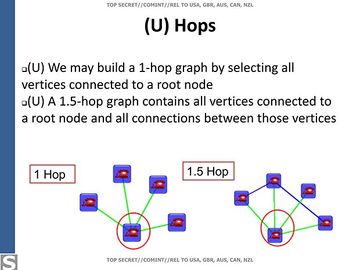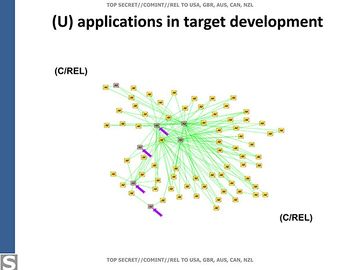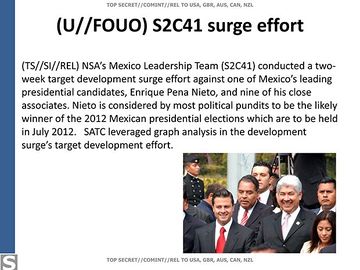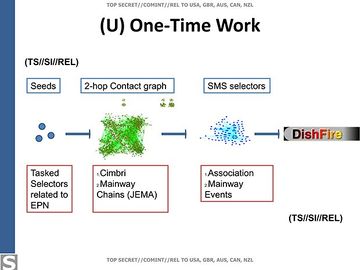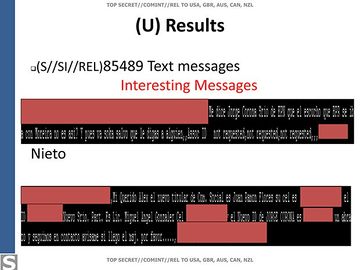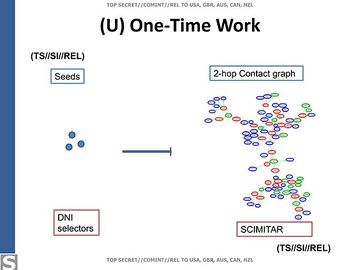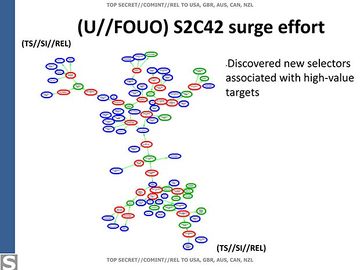كشف التنصت العالمي (2013-الحاضر)
| جزء من سلسلة عن |
| التجسس العالمي |
|---|
 |
| كشف |
| النظم |
| وكالات |
| أشخاص |
| أماكن |
| قوانين |
|
| تغييرات مقترحة |
| مفاهيم |
| موضوعات متعلقة |
|
|
 مراقبة وكالة الأمن القومي |
|---|
 |
كشفت التقارير الإخبارية المستمرة في وسائل الإعلام الدولية عن تفاصيل تشغيلية حول التنصت العالمي لوكالات التشفير الناطقة بالإنجليزية [1] لكل من الرعايا الأجانب والمحليين. تنبثق التقارير في الغالب من مخبأ للوثائق السرية للغاية مسربةً من قبل مقاول سابق بوكالة الأمن القومي إدوارد سنودن، والتي حصل عليها أثناء عمله لدى بوز ألن هاملتون، أحد أكبر مقاولي الدفاع والاستخبارات في الولايات المتحدة.[2]بالإضافة إلى مجموعة من الوثائق الفيدرالية الأمريكية، ورد أن مخبأ سنودن يحتوي على آلاف من ملفات المخابرات الأسترالية والبريطانية والكندية التي تمكن من الوصول إليها عبر شبكة خمسة أعين الحصرية.[2] في يونيو 2013، تم نشر أول وثائق سنودن في وقت واحد من قبل واشنطن پوست و گارديان، مما جذب اهتمامًا كبيراً من الجمهور.[3]استمر الكشف طوال عام 2013، وتم نشر جزء صغير من ذاكرة التخزين المؤقت الكاملة المقدرة للوثائق لاحقاً من قبل وسائل الإعلام الأخرى في جميع أنحاء العالم، وعلى الأخص نيويورك تايمز (الولايات المتحدة)، و هيئة الإذاعة الكندية، و هيئة الإذاعة الأسترالية، در شپيگل (ألمانيا)، أو گلوبو (البرازيل)، لو موند (فرنسا)، لسپرسو (إيطاليا)، إن آر سي هاندلسبلاد (هولندا)، داگبلاديت (النرويج)، إل پاييس (إسبانيا) و التلفزيون السويدي (السويد).[4]
سلطت هذه التقارير الإعلامية الضوء على الآثار المترتبة على العديد من المعاهدات السرية الموقعة من قبل أعضاء مجموعة يوكوسا في جهودهم لتنفيذ التنصت العالمية. على سبيل المثال، كشف فيلم در شپيگل عن كيفية قيام دائرة الاستخبارات الاتحادية الألمانية (ألمانية: Bundesnachrichtendienst; BND) بنقل "كميات هائلة من البيانات التي تم اعتراضها إلى وكالة الأمن القومي"،[5] بينما كشف التلفزيون السويدي أن مؤسسة راديو الدفاع الوطني (FRA) زودت وكالة الأمن القومي ببيانات من مجموعة البرقيات، بموجب معاهدة سرية تم توقيعها في عام 1954 للتعاون الثنائي في التنصت.[6] تشمل وكالات الأمن والاستخبارات الأخرى المشاركة في ممارسة المراقبة العالمية تلك الموجودة في أستراليا ( ASD)، وبريطانيا ( GCHQ)، وكندا ( CSE)، الدنمارك ( PET)، فرنسا ( DGSE)، ألمانيا ( BND)، إيطاليا ( AISE)، هولندا ( AIVD)، النرويج ( NIS)، إسبانيا ( CNI)، سويسرا ( NDB) ،سنغافورة ( SID) وكذلك إسرائيل ( ISNU)، التي تتلقى البيانات الأولية، غير المفلترة لمواطني الولايات المتحدة والتي تشاركها وكالة الأمن القومي.[7][8][9][10][11][12][13][14]
في 14 يونيو 2013، اتهم المدعون الأمريكيون إدوارد سنودن ابلتجسس و سرقة ممتلكات حكومية.[15] في أواخر يوليو 2013، مُنح اللجوء مؤقتاً لمدة عام واحد من قبل الحكومة الروسية،[16] مساهماً في تدهور العلاقات الأمريكية الروسية.[17][18] في 6 أغسطس 2013، ظهر الرئيس الأمريكي باراك أوباما علناً على شاشة التلفزيون الوطني حيث قال بشكل خاطئ[19][مطلوب مصدر أفضل]للأمريكيين أنه "ليس لدينا برنامج تجسس محلي" وأنه "لا يوجد تجسس على الأمريكيين".[20]وقرب نهاية أكتوبر 2013، حذر رئيس الوزراء البريطاني ديڤد كامرون گارديان بعدم نشر أي تسريبات أخرى، وإلا فسيحصل على إشعار دي أي.[21] في نوفمبر 2013، تم إجراء تحقيق جنائي في الكشف عن المعلومات من قبل فرق التحقيق الرئيسية.[22]في ديسمبر 2013، قال محرر گارديان آلان روسبردجر: "لقد نشرنا 26 وثيقة حتى الآن من أصل 58000 رأيناها."[23]
إن مدى مسؤولية تقارير وسائل الإعلام في إبلاغ الجمهور أمر متنازع عليه. في يناير 2014، قال أوباما إن "الطريقة المثيرة التي تم الكشف بها عن هذه الإفشاءات غالباً ما تلقي باهتمام أكثر من الضوء"[24] وقد لاحظ النقاد مثل شون ويلنتز أن العديد من وثائق سنودن التي تم الإفراج عنها لا تتعلق بالمراقبة المحلية.[25]وقد قدرت مؤسسة الدفاع الأمريكية والبريطانية الضرر الاستراتيجي في الفترة التي أعقبت الكشف بشكل أكبر من المنفعة العامة المدنية. في تقييمه الأول لهذه الإفصاحات، خلص الپنتاگون إلى أن سنودن ارتكب أكبر "سرقة" لأسرار الولايات المتحدة في تاريخ الولايات المتحدة.[26]وقد وصف السير ديڤد أوماند، المدير السابق لـ GCHQ، إفصاح سنودن بأنه "الخسارة الأكثر كارثية للمخابرات البريطانية على الإطلاق".[27]
خلفية
لخص بارتن گلمان، الصحفي الحائز على جائزة پوليتسر، والذي قاد تغطية صحيفة واشنطن پوست لإفصاحات سنودن، التسريبات على النحو التالي:
سلطت هذه الاكتشافات مجتمعة، الضوء على نظام التنصت العالمي الذي أزال الكثير من قيوده التاريخية بعد هجمات 11 سبتمبر. فوضت السلطات القانونية السرية وكالة الأمن القومي لتطهير سجلات الهاتف والإنترنت والمواقع لجميع السكان.
كشف فضح تفاصيل محددة عن تعاون وكالة الأمن القومي الوثيق مع الوكالات الفيدرالية الأمريكية مثل مكتب التحقيقات الفيدرالي (FBI)[28][29] و وكالة المخابرات المركزية (CIA)،[30][31]بالإضافة إلى مدفوعات الوكالة المالية التي لم يتم الإفصاح عنها سابقاً للعديد من الشركاء التجاريين وشركات الاتصالات،[32][33][34] فضلاً عن علاقاتها غير المعلنة سابقاً مع شركاء دوليين مثل بريطانيا،[35][36] وفرنسا،[12][37] وألمانيا،[5][38] و معاهداتها السرية مع الحكومات الأجنبية التي تم إنشاؤها مؤخراً لمشاركة البيانات التي تم اعتراضها من مواطني كل منها[7][39][40][41]تم الإعلان عن عمليات الكشف على مدار عدة أشهر منذ يونيو 2013، من قبل الصحافة في عدة دول من المجموعة التي سربها المقاول السابق لوكالة الأمن القومي إدوارد ج. سنودن، [42]الذي حصل على الأسرار أثناء عمله عن بوز ألن هاملتون.[2]
أكد جورج براندز، النائب العام لأستراليا، أن إفشاء سنودن هو "أخطر نكسة للاستخبارات الغربية منذ الحرب العالمية الثانية."[43]
التنصت العالمي
اعتبارا من ديسمبر 2013[تحديث]، تشمل برامج المراقبة العالمية:
| البرنامج | المساهمون الدوليون و/أو الشركاء | الشركاء التجاريون |
|---|---|---|
|
||
|
||
| ||
|
||
| ستيت روم | ||
| لوستر |
|
كانت وكالة الأمن القومي تحصل أيضًا على بيانات مباشرة من شركات الاتصالات التي تحمل الاسم الرمزي آرتفس، و ليثيوم، و سيرينايد، و ستيل نايت، و إكس. ولم يتم تضمين الهويات الحقيقية للشركات التي تقف وراء هذه الأسماء الرمزية في تفريغ مستندات سنودن لأنها كانت محمية باعتبارها معلومات خاضعة للسيطرة الاستثنائية مما يمنع تداولها على نطاق واسع حتى لأولئك (مثل سنودن) الذين لديهم التصريح الأمني اللازم.[66][67]
كشف المستور
على الرغم من أن الحجم الدقيق لإفصاح سنودن لا يزال غير معروف، فقد تم وضع التقديرات التالية من قبل العديد من المسؤولين الحكوميين:
- ما لا يقل عن 15000 ملف استخبارات أسترالي ، وفقًا لمسؤولين أستراليين[43]
- ما لا يقل عن 58 ألف ملف استخباراتي بريطاني، بحسب مسؤولين بريطانيين[68]
- حوالي 1.7 مليون ملف استخباراتي أمريكي، بحسب نقاط حديث وزارة دفاع الولايات المتحدة[26][69]
بصفته متعاقداً مع وكالة الأمن القومي، مُنح سنودن حق الوصول إلى وثائق الحكومة الأمريكية جنباً إلى جنب مع وثائق سرية للغاية للعديد من الحكومات المتحالفة، عبر شبكة خمسة أعين الحصرية.[70] يدعي سنودن أنه لا يمتلك حالياً أياً من هذه الوثائق فعلياً، بعد أن سلم جميع النسخ للصحفيين الذين التقى بهم في هونگ كونگ.[71]
وفقاً لمحاميه، تعهد سنودن بعدم الكشف عن أي وثائق أثناء وجوده في روسيا، تاركاً مسؤولية الكشف عن المزيد من المعلومات للصحفيين فقط..[72] اعتباراً من عام 2014، تمكنت المنافذ الإخبارية التالية من الوصول إلى بعض الوثائق التي قدمها سنودن: هيئة الإذاعة الأسترالية، هيئة الإذاعة الكندية، القناة الرابعة البريطانية، در شپيگل، إل پاييس، إل موندو، لسپرسو، لو موند، هيئة الإذاعة الوطنية، إن آر سي هاندلسبلاد، داگبلاديت، أو گلوبو، ساوث تشاينا مورننگ پوست و زود دويتشه تسايتونگ و التلفزيون السويدي وگارديان و نيويورك تايمز و واشنطن پوست.
السياق التاريخي
في السبعينيات، كشف محلل وكالة الأمن القومي پيري فيلووك (تحت الاسم المستعار "وينسلو پيك") عن وجود اتفاقية يوكوسا، التي تشكل أساس شبكة إتشلون، التي تم الكشف عن وجودها في عام 1988 من قبل موظفة لوكهيد مارگريت نيوسهام.[73][74]قبل أشهر من أحداث 11 سبتمبر 2001 وأثناء تداعياتها، تم توفير مزيد من التفاصيل عن التنصت العالمي من قبل أفراد مختلفين مثل المسؤول السابق في MI5 ديڤد شيلر والصحفي جيمس بامفورد،[75][76]وتبعهم:
- موظفو وكالة الأمن القومي وليام بيني و توماس أندروز دريك، الذين كشفوا أن وكالة الأمن القومي توسع نطاق تنصتها بسرعة[77][78]
- موظفة GCHQ كاثرين گون، الذي كشف عن مؤامرة لاستفزاز مندوبي الأمم المتحدة قبل حرب العراق[79]
- وزيرة الحكومة البريطانية كلير شورت، التي كشفت في عام 2004 أن المملكة المتحدة قد تجسست على الأمين العام للأمم المتحدة كوفي عنان[80]
- موظف وكالة الأمن القومي روس تايس، الذي أثار الجدل حول تنصت وكالة الأمن القومي بعد الكشف عن أن حكم بوش قد تجسس على مواطنين أمريكيين دون موافقة المحكمة[81][82]
- الصحفية لزلي كولي من يو إس إيه توداي، والتي كشفت في عام 2006 أن وكالة الأمن القومي تحتفظ بقاعدة بيانات ضخمة للمكالمات الهاتفية للأمريكيين[83]
- موظف أي تي أند تي مارك كلاين، الذي كشف في عام 2006 عن وجود Room 641A لوكالة الأمن القومي[84]
- الناشطان جوليان أسانج و تشلسي ماننگ، الذين كشفوا في عام 2011 عن وجود سلك التنصت الجماعي[85]
- الصحفي مايكل هايستنگز، الذي كشف في عام 2012 أن المحتجين من حركة احتلال وال ستريت ظلوا تحت المراقبة[86]
في أعقاب اكتشافات سنودن، خلص الپنتاگون إلى أن سنودن ارتكب أكبر سرقة لأسرار أمريكية في تاريخ الولايات المتحدة.[26] في أستراليا، وصفت الحكومة الائتلافية التسريبات بأنها الضربة الأشد ضرراً التي تعرضت لها المخابرات الأسترالية في التاريخ.[43] وصف السير ديڤد أوماند، المدير السابق لـ GCHQ، كشف سنودن بأنه "الخسارة الأكثر كارثية للمخابرات البريطانية على الإطلاق".[27]
Timeline

في أبريل 2012، بدأ مقاول وكالة الأمن القومي إدوارد سنودن في تنزيل المستندات.[88]في ذلك العام ، أجرى سنودن أول اتصال له مع الصحفي گلن گرينوالد، ثم موظف لدى گارديان، واتصل بمخرجة الأفلام الوثائقية لورا پويتراس في يناير 2013.[89][90]
2013
مايو
في مايو 2013، ذهب سنودن في إجازة مؤقتة من منصبه في وكالة الأمن القومي، متذرعاً بتلقي العلاج من الصرع. في نهاية شهر مايو، سافر إلى هونگ كونگ.[91][92] سافر گرينوالد وپويتراس ومراسل الدفاع والاستخبارات في صحيفة گارديان إيون مكآسكل إلى هونگ كونگ لمقابلة سنودن.
يونيو
بعد أن عقدت محررة گارديان ومقرها الولايات المتحدة، جانين گبسن عدة اجتماعات في نيويورك، قررت يسافر أن گرينوالد وپويتراس ومراسل گارديان للدفاع والاستخبارات إيون مكآسكل إلى هونگ كونگ للقاء سنودن. في الخامس من يونيو، في أول تقرير إعلامي مبني على المادة المسربة،[93]كشفت گارديان عن أمر محكمة سري للغاية يُظهر أن وكالة الأمن القومي قد جمعت سجلات هاتفية من أكثر من 120 مليون من مشتركي ڤرايزون.[94] بموجب الأمر، تم تسليم أرقام كلا الطرفين في المكالمة، بالإضافة إلى بيانات الموقع والمعرفات الفريدة ووقت المكالمة ومدة المكالمة إلى مكتب التحقيقات الفيدرالي، الذي قام بتسليم السجلات إلى وكالة الأمن القومي.[94]وفقاً لـ وال ستريت جورنال، فإن طلب ڤرايزون هو جزء من برنامج بيانات مثير للجدل، يسعى إلى تخزين سجلات جميع المكالمات التي يتم إجراؤها في الولايات المتحدة، ولكنه لا يجمع المعلومات مباشرةً من تي-موبايل يو إس و ڤرايزون وايرلس، ويرجع ذلك جزئياً إلى علاقات الملكية الأجنبية بينهما.[95]

في 6 يونيو 2013، الكشف الإعلامي الثاني، الكشف عن برنامج مراقبة پريزم (الذي يجمع رسائل البريد الإلكتروني والصوت والنص والفيديو للأجانب وعدد غير معروف من الأمريكيين من مايكروسوفت و جوجل و فيسلبوك و ياهو و أپل وعمالقة التكنولوجيا الآخرين)،[96][97][98][99]تم نشره في وقت واحد من قبل گارديان و واشنطن پوست.[87][100]
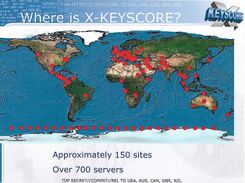
كشفت در شپيگل تجسس وكالة الأمن القومي على عدة بعثات دبلوماسية لـ الاتحاد الاوروبي و مقر الأمم المتحدة في نيويورك.[101][102] خلال حلقات محددة خلال فترة أربع سنوات، اخترقت وكالة الأمن القومي العديد من شركات الهاتف المحمول الصينية،[103]الجامعة الصينية في هونگ كونگ و جامعة تسينگهوا في بكين ،[104] ومشغل شبكة الألياف البصرية الآسيوية پاكنت.[105]فقط أستراليا وكندا ونيوزيلندا والمملكة المتحدة مُستثناة صراحةً من هجمات وكالة الأمن القومي، التي هدفها الرئيسي في الاتحاد الأوروبي هو ألمانيا[106]إحدى طرق التنصت على أجهزة الفاكس المشفرة المستخدمة في سفارة الاتحاد الأوروبي تحمل الاسم الرمزي دروپماير.[107]
خلال قمة لندن لمجموعة العشرين عام 2009، اعترضت مركز الاتصالات الحكومية البريطانية (GCHQ) التابع لوكالة المخابرات البريطانية اتصالات الدبلوماسيين الأجانب.[108]بالإضافة إلى ذلك، كان GCHQ يعترض ويخزن كميات كبيرة من حركة مرور الألياف الضوئية عبر تمپورا.[109] هناك مكونان رئيسيان من تمپورا يطلق عليهما مشروع إتقان الإنترنت (MTI) و استغلال الاتصالات العالمية.[110] يتم الاحتفاظ بالبيانات لمدة ثلاثة أيام بينما يتم الاحتفاظ بـ البيانات الوصفية لمدة ثلاثين يوماً.[111]تتم مشاركة البيانات التي تم جمعها بواسطة GCHQ بموجب تمپورا مع وكالة الأمن القومي (NSA) للولايات المتحدة.[110]
من عام 2001 إلى عام 2011، جمعت وكالة الأمن القومي كميات هائلة من سجلات البيانات الوصفية التي توضح بالتفصيل البريد الإلكتروني واستخدام الإنترنت للأمريكيين عبر ستلر وند،[112] والتي تم إنهاؤها لاحقاً بسبب قيود التشغيل والموارد. تم استبداله لاحقاً ببرامج مراقبة أحدث مثل شل ترمپت، والتي "عالجت سجل البيانات الوصفية رقم تريليون" بحلول نهاية ديسمبر 2012.[113]
تتبع وكالة الأمن القومي إجراءات محددة لاستهداف الأشخاص غير الأمريكيين[114]وتقليل جمع البيانات من الأشخاص الأمريكيين.[115]تسمح هذه السياسات التي وافقت عليها المحكمة لوكالة الأمن القومي:[116][117]
- الاحتفاظ بالبيانات التي قد تحتوي على تفاصيل الأشخاص الأمريكيين لمدة تصل إلى خمس سنوات;
- الاحتفاظ والاستفادة من الاتصالات المحلية "المكتسبة عن غير قصد" إذا كانت تحتوي على معلومات استخباراتية قابلة للاستخدام، أو معلومات عن نشاط إجرامي، أو تهديد بإلحاق الأذى بالأشخاص أو الممتلكات، أو كانت مشفرة، أو يعتقد أنها تحتوي على أي معلومات ذات صلة بالأمن السيبراني;
- الاحتفاظ "بالمعلومات الاستخباراتية الأجنبية" الواردة في اتصالات بين المحامي وموكله; و
- الوصول إلى محتوى الاتصالات التي تم جمعها من "آلة (آلات) مقرها الولايات المتحدة" أو أرقام هواتف لتحديد ما إذا كانت الأهداف موجودة في الولايات المتحدة، لأغراض وقف المزيد من المراقبة\التنصت.
وفقاً لـ باوندلس إنفورمانت، تم جمع أكثر من 97 مليار قطعة من المعلومات الاستخباراتية خلال فترة 30 يوماً تنتهي في مارس 2013. من بين جميع مجموعات المعلومات البالغ عددها 97 ملياراً، نشأت حوالي 3 مليارات مجموعة بيانات من شبكات الحاسب للولايات المتحدة [118] وتم جمع حوالي 500 مليون سجل بيانات وصفية من الشبكات الألمانية.[119]
في أغسطس 2013، تم الكشف عن أن دائرة المخابرات الاتحادية (BND) لألمانيا ينقل كميات هائلة من سجلات البيانات الوصفية إلى وكالة الأمن القومي.[120]
كشفت صحيفة در شپيگل أنه من بين جميع 27 دولة عضو في الاتحاد الأوروبي ،فإن ألمانيا هي الأكثر استهدافاً بسبب المراقبة والتخزين المنهجي لـ NSA للهاتف وبيانات الاتصال بالإنترنت في ألمانيا. وفقاً للصحيفة، تخزن وكالة الأمن القومي بيانات من حوالي نصف مليار اتصال اتصالات في ألمانيا كل شهر. تتضمن هذه البيانات المكالمات الهاتفية ورسائل البريد الإلكتروني والرسائل النصية للهاتف المحمول ونصوص الدردشة.[121]
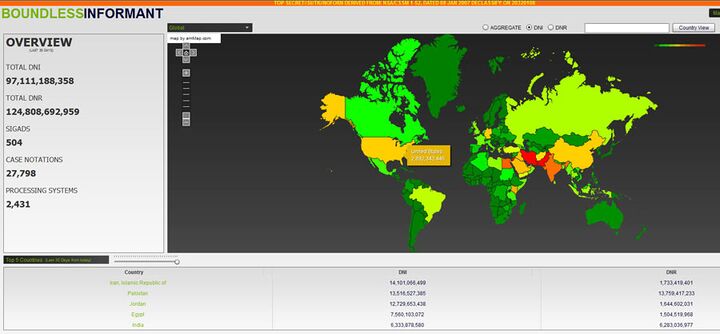
July
The NSA gained massive amounts of information captured from the monitored data traffic in Europe. For example, in December 2012, the NSA gathered on an average day metadata from some 15 million telephone connections and 10 million Internet datasets. The NSA also monitored the European Commission in Brussels and monitored EU diplomatic Facilities in Washington and at the United Nations by placing bugs in offices as well as infiltrating computer networks.[122]
The U.S. government made as part of its UPSTREAM data collection program deals with companies to ensure that it had access to and hence the capability to surveil undersea fiber-optic cables which deliver e-mails, Web pages, other electronic communications and phone calls from one continent to another at the speed of light.[123][124]
According to the Brazilian newspaper O Globo, the NSA spied on millions of emails and calls of Brazilian citizens,[125][126] while Australia and New Zealand have been involved in the joint operation of the NSA's global analytical system XKeyscore.[127][128] Among the numerous allied facilities contributing to XKeyscore are four installations in Australia and one in New Zealand:
- Pine Gap near Alice Springs, Australia, which is partly operated by the U.S. Central Intelligence Agency (CIA)[128]
- The Shoal Bay Receiving Station near Darwin, Australia, is operated by the Australian Signals Directorate (ASD)[128]
- The Australian Defence Satellite Communications Station near Geraldton, Australia, is operated by the ASD[128]
- HMAS Harman outside Canberra, Australia, is operated by the ASD[128]
- Waihopai Station near Blenheim, New Zealand, is operated by New Zealand's Government Communications Security Bureau (GCSB)[128]
O Globo released an NSA document titled "Primary FORNSAT Collection Operations", which revealed the specific locations and codenames of the FORNSAT intercept stations in 2002.[129]
According to Edward Snowden, the NSA has established secret intelligence partnerships with many Western governments.[128] The Foreign Affairs Directorate (FAD) of the NSA is responsible for these partnerships, which, according to Snowden, are organized such that foreign governments can "insulate their political leaders" from public outrage in the event that these global surveillance partnerships are leaked.[130]
In an interview published by Der Spiegel, Snowden accused the NSA of being "in bed together with the Germans".[131] The NSA granted the German intelligence agencies BND (foreign intelligence) and BfV (domestic intelligence) access to its controversial XKeyscore system.[132] In return, the BND turned over copies of two systems named Mira4 and Veras, reported to exceed the NSA's SIGINT capabilities in certain areas.[5] Every day, massive amounts of metadata records are collected by the BND and transferred to the NSA via the Bad Aibling Station near Munich, Germany.[5] In December 2012 alone, the BND handed over 500 million metadata records to the NSA.[133][134]
In a document dated January 2013, the NSA acknowledged the efforts of the BND to undermine privacy laws:
The BND has been working to influence the German government to relax interpretation of the privacy laws to provide greater opportunities of intelligence sharing.[134]
According to an NSA document dated April 2013, Germany has now become the NSA's "most prolific partner".[134] Under a section of a separate document leaked by Snowden titled "Success Stories", the NSA acknowledged the efforts of the German government to expand the BND's international data sharing with partners:
The German government modifies its interpretation of the G-10 privacy law … to afford the BND more flexibility in sharing protected information with foreign partners.[51]
In addition, the German government was well aware of the PRISM surveillance program long before Edward Snowden made details public. According to Angela Merkel's spokesman Steffen Seibert, there are two separate PRISM programs – one is used by the NSA and the other is used by NATO forces in Afghanistan.[135] The two programs are "not identical".[135]
The Guardian revealed further details of the NSA's XKeyscore tool, which allows government analysts to search through vast databases containing emails, online chats and the browsing histories of millions of individuals without prior authorization.[136][137][138] Microsoft "developed a surveillance capability to deal" with the interception of encrypted chats on Outlook.com, within five months after the service went into testing. NSA had access to Outlook.com emails because "Prism collects this data prior to encryption."[47]
In addition, Microsoft worked with the FBI to enable the NSA to gain access to its cloud storage service SkyDrive. An internal NSA document dating from August 3, 2012 described the PRISM surveillance program as a "team sport".[47]
Even if there is no reason to suspect U.S. citizens of wrongdoing, the CIA's National Counterterrorism Center is allowed to examine federal government files for possible criminal behavior. Previously the NTC was barred to do so, unless a person was a terror suspect or related to an investigation.[139]
Snowden also confirmed that Stuxnet was cooperatively developed by the United States and Israel.[140] In a report unrelated to Edward Snowden, the French newspaper Le Monde revealed that France's DGSE was also undertaking mass surveillance, which it described as "illegal and outside any serious control".[141][142]
August
Documents leaked by Edward Snowden that were seen by Süddeutsche Zeitung (SZ) and Norddeutscher Rundfunk revealed that several telecom operators have played a key role in helping the British intelligence agency Government Communications Headquarters (GCHQ) tap into worldwide fiber-optic communications. The telecom operators are:
- Verizon Business (codenamed "Dacron")[56][143]
- BT (codenamed "Remedy")[56][143]
- Vodafone Cable (codenamed "Gerontic")[56][143]
- Global Crossing (codenamed "Pinnage")[56][143]
- Level 3 (codenamed "Little")[56][143]
- Viatel (codenamed "Vitreous")[56][143]
- Interoute (codenamed "Streetcar")[56][143]
Each of them were assigned a particular area of the international fiber-optic network for which they were individually responsible. The following networks have been infiltrated by GCHQ: TAT-14 (EU-UK-US), Atlantic Crossing 1 (EU-UK-US), Circe South (France-UK), Circe North (Netherlands-UK), Flag Atlantic-1, Flag Europa-Asia, SEA-ME-WE 3 (Southeast Asia-Middle East-Western Europe), SEA-ME-WE 4 (Southeast Asia-Middle East-Western Europe), Solas (Ireland-UK), UK-France 3, UK-Netherlands 14, ULYSSES (EU-UK), Yellow (UK-US) and Pan European Crossing (EU-UK).[144]
Telecommunication companies who participated were "forced" to do so and had "no choice in the matter".[144] Some of the companies were subsequently paid by GCHQ for their participation in the infiltration of the cables.[144] According to the SZ, GCHQ has access to the majority of internet and telephone communications flowing throughout Europe, can listen to phone calls, read emails and text messages, see which websites internet users from all around the world are visiting. It can also retain and analyse nearly the entire European internet traffic.[144]
GCHQ is collecting all data transmitted to and from the United Kingdom and Northern Europe via the undersea fibre optic telecommunications cable SEA-ME-WE 3. The Security and Intelligence Division (SID) of Singapore co-operates with Australia in accessing and sharing communications carried by the SEA-ME-WE-3 cable. The Australian Signals Directorate (ASD) is also in a partnership with British, American and Singaporean intelligence agencies to tap undersea fibre optic telecommunications cables that link Asia, the Middle East and Europe and carry much of Australia's international phone and internet traffic.[145]
The U.S. runs a top-secret surveillance program known as the Special Collection Service (SCS), which is based in over 80 U.S. consulates and embassies worldwide.[146][147] The NSA hacked the United Nations' video conferencing system in Summer 2012 in violation of a UN agreement.[146][147]
The NSA is not just intercepting the communications of Americans who are in direct contact with foreigners targeted overseas, but also searching the contents of vast amounts of e-mail and text communications into and out of the country by Americans who mention information about foreigners under surveillance.[148] It also spied on Al Jazeera and gained access to its internal communications systems.[149]
The NSA has built a surveillance network that has the capacity to reach roughly 75% of all U.S. Internet traffic.[150][151][152] U.S. Law-enforcement agencies use tools used by computer hackers to gather information on suspects.[153][154] An internal NSA audit from May 2012 identified 2776 incidents i.e. violations of the rules or court orders for surveillance of Americans and foreign targets in the U.S. in the period from April 2011 through March 2012, while U.S. officials stressed that any mistakes are not intentional.[155][156][157][158][159][160][161]
The FISA Court that is supposed to provide critical oversight of the U.S. government's vast spying programs has limited ability to do so and it must trust the government to report when it improperly spies on Americans.[162] A legal opinion declassified on August 21, 2013, revealed that the NSA intercepted for three years as many as 56,000 electronic communications a year of Americans not suspected of having links to terrorism, before FISA court that oversees surveillance found the operation unconstitutional in 2011.[163][164][165][166][167] Under the Corporate Partner Access project, major U.S. telecommunications providers receive hundreds of millions of dollars each year from the NSA.[168] Voluntary cooperation between the NSA and the providers of global communications took off during the 1970s under the cover name BLARNEY.[168]
A letter drafted by the Obama administration specifically to inform Congress of the government's mass collection of Americans' telephone communications data was withheld from lawmakers by leaders of the House Intelligence Committee in the months before a key vote affecting the future of the program.[169][170]
The NSA paid GCHQ over £100 Million between 2009 and 2012, in exchange for these funds GCHQ "must pull its weight and be seen to pull its weight." Documents referenced in the article explain that the weaker British laws regarding spying are "a selling point" for the NSA. GCHQ is also developing the technology to "exploit any mobile phone at any time."[171] The NSA has under a legal authority a secret backdoor into its databases gathered from large Internet companies enabling it to search for U.S. citizens' email and phone calls without a warrant.[172][173]
The Privacy and Civil Liberties Oversight Board urged the U.S. intelligence chiefs to draft stronger US surveillance guidelines on domestic spying after finding that several of those guidelines have not been updated up to 30 years.[174][175] U.S. intelligence analysts have deliberately broken rules designed to prevent them from spying on Americans by choosing to ignore so-called "minimisation procedures" aimed at protecting privacy[176][177] and used the NSA's agency's enormous eavesdropping power to spy on love interests.[178]
After the U.S. Foreign Secret Intelligence Court ruled in October 2011 that some of the NSA's activities were unconstitutional, the agency paid millions of dollars to major internet companies to cover extra costs incurred in their involvement with the PRISM surveillance program.[179]
"Mastering the Internet" (MTI) is part of the Interception Modernisation Programme (IMP) of the British government that involves the insertion of thousands of DPI (deep packet inspection) "black boxes" at various internet service providers, as revealed by the British media in 2009.[180]
In 2013, it was further revealed that the NSA had made a £17.2 million financial contribution to the project, which is capable of vacuuming signals from up to 200 fibre-optic cables at all physical points of entry into Great Britain.[181]
September
The Guardian and The New York Times reported on secret documents leaked by Snowden showing that the NSA has been in "collaboration with technology companies" as part of "an aggressive, multipronged effort" to weaken the encryption used in commercial software, and GCHQ has a team dedicated to cracking "Hotmail, Google, Yahoo and Facebook" traffic.[188]
Germany's domestic security agency Bundesverfassungsschutz (BfV) systematically transfers the personal data of German residents to the NSA, CIA and seven other members of the United States Intelligence Community, in exchange for information and espionage software.[189][190][191] Israel, Sweden and Italy are also cooperating with American and British intelligence agencies. Under a secret treaty codenamed "Lustre", French intelligence agencies transferred millions of metadata records to the NSA.[64][65][192][193]
The Obama Administration secretly won permission from the Foreign Intelligence Surveillance Court in 2011 to reverse restrictions on the National Security Agency's use of intercepted phone calls and e-mails, permitting the agency to search deliberately for Americans' communications in its massive databases. The searches take place under a surveillance program Congress authorized in 2008 under Section 702 of the Foreign Intelligence Surveillance Act. Under that law, the target must be a foreigner "reasonably believed" to be outside the United States, and the court must approve the targeting procedures in an order good for one year. But a warrant for each target would thus no longer be required. That means that communications with Americans could be picked up without a court first determining that there is probable cause that the people they were talking to were terrorists, spies or "foreign powers." The FISC extended the length of time that the NSA is allowed to retain intercepted U.S. communications from five years to six years with an extension possible for foreign intelligence or counterintelligence purposes. Both measures were done without public debate or any specific authority from Congress.[194]
A special branch of the NSA called "Follow the Money" (FTM) monitors international payments, banking and credit card transactions and later stores the collected data in the NSA's own financial databank "Tracfin".[195] The NSA monitored the communications of Brazil's president Dilma Rousseff and her top aides.[196] The agency also spied on Brazil's oil firm Petrobras as well as French diplomats, and gained access to the private network of the Ministry of Foreign Affairs of France and the SWIFT network.[197]
In the United States, the NSA uses the analysis of phone call and e-mail logs of American citizens to create sophisticated graphs of their social connections that can identify their associates, their locations at certain times, their traveling companions and other personal information.[198] The NSA routinely shares raw intelligence data with Israel without first sifting it to remove information about U.S. citizens.[7][199]
In an effort codenamed GENIE, computer specialists can control foreign computer networks using "covert implants," a form of remotely transmitted malware on tens of thousands of devices annually.[200][201][202][203] As worldwide sales of smartphones began exceeding those of feature phones, the NSA decided to take advantage of the smartphone boom. This is particularly advantageous because the smartphone combines a myriad of data that would interest an intelligence agency, such as social contacts, user behavior, interests, location, photos and credit card numbers and passwords.[204]
An internal NSA report from 2010 stated that the spread of the smartphone has been occurring "extremely rapidly"—developments that "certainly complicate traditional target analysis."[204] According to the document, the NSA has set up task forces assigned to several smartphone manufacturers and operating systems, including Apple Inc.'s iPhone and iOS operating system, as well as Google's Android mobile operating system.[204] Similarly, Britain's GCHQ assigned a team to study and crack the BlackBerry.[204]
Under the heading "iPhone capability", the document notes that there are smaller NSA programs, known as "scripts", that can perform surveillance on 38 different features of the iOS 3 and iOS 4 operating systems. These include the mapping feature, voicemail and photos, as well as Google Earth, Facebook and Yahoo! Messenger.[204]
On September 9, 2013, an internal NSA presentation on iPhone Location Services was published by Der Spiegel. One slide shows scenes from Apple's 1984-themed television commercial alongside the words "Who knew in 1984..."; another shows Steve Jobs holding an iPhone, with the text "...that this would be big brother..."; and a third shows happy consumers with their iPhones, completing the question with "...and the zombies would be paying customers?"[205]
October
On October 4, 2013, The Washington Post and The Guardian jointly reported that the NSA and GCHQ had made repeated attempts to spy on anonymous Internet users who have been communicating in secret via the anonymity network Tor. Several of these surveillance operations involved the implantation of malicious code into the computers of Tor users who visit particular websites. The NSA and GCHQ had partly succeeded in blocking access to the anonymous network, diverting Tor users to insecure channels. The government agencies were also able to uncover the identity of some anonymous Internet users.[206][207][208][209][210][211][212][213][214]
The Communications Security Establishment (CSE) has been using a program called Olympia to map the communications of Brazil's Mines and Energy Ministry by targeting the metadata of phone calls and emails to and from the ministry.[215][216]
The Australian Federal Government knew about the PRISM surveillance program months before Edward Snowden made details public.[217][218]
The NSA gathered hundreds of millions of contact lists from personal e-mail and instant messaging accounts around the world. The agency did not target individuals. Instead it collected contact lists in large numbers that amount to a sizable fraction of the world's e-mail and instant messaging accounts. Analysis of that data enables the agency to search for hidden connections and to map relationships within a much smaller universe of foreign intelligence targets.[219][220][221][222]
The NSA monitored the public email account of former Mexican president Felipe Calderón (thus gaining access to the communications of high-ranking cabinet members), the emails of several high-ranking members of Mexico's security forces and text and the mobile phone communication of current Mexican president Enrique Peña Nieto.[223][224] The NSA tries to gather cellular and landline phone numbers—often obtained from American diplomats—for as many foreign officials as possible. The contents of the phone calls are stored in computer databases that can regularly be searched using keywords.[225][226]
The NSA has been monitoring telephone conversations of 35 world leaders.[227] The U.S. government's first public acknowledgment that it tapped the phones of world leaders was reported on October 28, 2013, by the Wall Street Journal after an internal U.S. government review turned up NSA monitoring of some 35 world leaders.[228] GCHQ has tried to keep its mass surveillance program a secret because it feared a "damaging public debate" on the scale of its activities which could lead to legal challenges against them.[229]
The Guardian revealed that the NSA had been monitoring telephone conversations of 35 world leaders after being given the numbers by an official in another U.S. government department. A confidential memo revealed that the NSA encouraged senior officials in such Departments as the White House, State and The Pentagon, to share their "Rolodexes" so the agency could add the telephone numbers of leading foreign politicians to their surveillance systems. Reacting to the news, German leader Angela Merkel, arriving in Brussels for an EU summit, accused the U.S. of a breach of trust, saying: "We need to have trust in our allies and partners, and this must now be established once again. I repeat that spying among friends is not at all acceptable against anyone, and that goes for every citizen in Germany."[227] The NSA collected in 2010 data on ordinary Americans' cellphone locations, but later discontinued it because it had no "operational value."[230]
Under Britain's MUSCULAR programme, the NSA and GCHQ have secretly broken into the main communications links that connect Yahoo and Google data centers around the world and thereby gained the ability to collect metadata and content at will from hundreds of millions of user accounts.[231][232][233][234][235]
The mobile phone of German Chancellor Angela Merkel might have been tapped by U.S. intelligence.[236][237][238][239][240][241][242] According to the Spiegel this monitoring goes back to 2002[243][244] and ended in the summer of 2013,[228] while The New York Times reported that Germany has evidence that the NSA's surveillance of Merkel began during George W. Bush's tenure.[245] After learning from Der Spiegel magazine that the NSA has been listening in to her personal mobile phone, Merkel compared the snooping practices of the NSA with those of the Stasi.[246] It was reported in March 2014, by Der Spiegel that Merkel had also been placed on an NSA surveillance list alongside 122 other world leaders.[247]
On October 31, 2013, Hans-Christian Ströbele, a member of the German Bundestag, met Snowden in Moscow and revealed the former intelligence contractor's readiness to brief the German government on NSA spying.[248]
A highly sensitive signals intelligence collection program known as Stateroom involves the interception of radio, telecommunications and internet traffic. It is operated out of the diplomatic missions of the Five Eyes (Australia, Britain, Canada, New Zealand, United States) in numerous locations around the world. The program conducted at U.S. diplomatic missions is run in concert by the U.S. intelligence agencies NSA and CIA in a joint venture group called "Special Collection Service" (SCS), whose members work undercover in shielded areas of the American Embassies and Consulates, where they are officially accredited as diplomats and as such enjoy special privileges. Under diplomatic protection, they are able to look and listen unhindered. The SCS for example used the American Embassy near the Brandenburg Gate in Berlin to monitor communications in Germany's government district with its parliament and the seat of the government.[242][249][250][251]
Under the Stateroom surveillance programme, Australia operates clandestine surveillance facilities to intercept phone calls and data across much of Asia.[250][252]
In France, the NSA targeted people belonging to the worlds of business, politics or French state administration. The NSA monitored and recorded the content of telephone communications and the history of the connections of each target i.e. the metadata.[253][254] The actual surveillance operation was performed by French intelligence agencies on behalf of the NSA.[64][255] The cooperation between France and the NSA was confirmed by the Director of the NSA, Keith B. Alexander, who asserted that foreign intelligence services collected phone records in "war zones" and "other areas outside their borders" and provided them to the NSA.[256]
The French newspaper Le Monde also disclosed new PRISM and Upstream slides (See Page 4, 7 and 8) coming from the "PRISM/US-984XN Overview" presentation.[257]
In Spain, the NSA intercepted the telephone conversations, text messages and emails of millions of Spaniards, and spied on members of the Spanish government.[258] Between December 10, 2012 and January 8, 2013, the NSA collected metadata on 60 million telephone calls in Spain.[259]
According to documents leaked by Snowden, the surveillance of Spanish citizens was jointly conducted by the NSA and the intelligence agencies of Spain.[260][261]
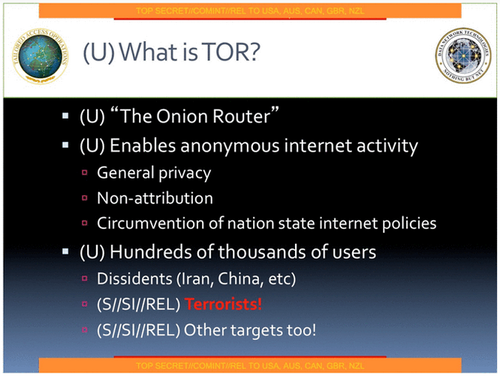
November
The New York Times reported that the NSA carries out an eavesdropping effort, dubbed Operation Dreadnought, against the Iranian leader Ayatollah Ali Khamenei. During his 2009 visit to Iranian Kurdistan, the agency collaborated with GCHQ and the U.S.'s National Geospatial-Intelligence Agency, collecting radio transmissions between aircraft and airports, examining Khamenei's convoy with satellite imagery, and enumerating military radar stations. According to the story, an objective of the operation is "communications fingerprinting": the ability to distinguish Khamenei's communications from those of other people in Iran.[262]
The same story revealed an operation code-named Ironavenger, in which the NSA intercepted e-mails sent between a country allied with the United States and the government of "an adversary". The ally was conducting a spear-phishing attack: its e-mails contained malware. The NSA gathered documents and login credentials belonging to the enemy country, along with knowledge of the ally's capabilities for attacking computers.[262]
According to the British newspaper The Independent, the British intelligence agency GCHQ maintains a listening post on the roof of the British Embassy in Berlin that is capable of intercepting mobile phone calls, wi-fi data and long-distance communications all over the German capital, including adjacent government buildings such as the Reichstag (seat of the German parliament) and the Chancellery (seat of Germany's head of government) clustered around the Brandenburg Gate.[263]
Operating under the code-name "Quantum Insert", GCHQ set up a fake website masquerading as LinkedIn, a social website used for professional networking, as part of its efforts to install surveillance software on the computers of the telecommunications operator Belgacom.[264][265][266] In addition, the headquarters of the oil cartel OPEC were infiltrated by GCHQ as well as the NSA, which bugged the computers of nine OPEC employees and monitored the General Secretary of OPEC.[264]
For more than three years GCHQ has been using an automated monitoring system code-named "Royal Concierge" to infiltrate the reservation systems of at least 350 prestigious hotels in many different parts of the world in order to target, search and analyze reservations to detect diplomats and government officials.[267] First tested in 2010, the aim of the "Royal Concierge" is to track down the travel plans of diplomats, and it is often supplemented with surveillance methods related to human intelligence (HUMINT). Other covert operations include the wiretapping of room telephones and fax machines used in targeted hotels as well as the monitoring of computers hooked up to the hotel network.[267]
In November 2013, the Australian Broadcasting Corporation and The Guardian revealed that the Australian Signals Directorate (DSD) had attempted to listen to the private phone calls of the president of Indonesia and his wife. The Indonesian foreign minister, Marty Natalegawa, confirmed that he and the president had contacted the ambassador in Canberra. Natalegawa said any tapping of Indonesian politicians' personal phones "violates every single decent and legal instrument I can think of—national in Indonesia, national in Australia, international as well".[268]
Other high-ranking Indonesian politicians targeted by the DSD include:
- Boediono[269] (Vice President)
- Jusuf Kalla[269] (Former Vice President)
- Dino Patti Djalal[269] (Ambassador to the United States)
- Andi Mallarangeng[269] (Government spokesperson)
- Hatta Rajasa[269] (State Secretary)
- Sri Mulyani Indrawati[269] (Former Finance Minister and current managing director of the World Bank)
- Widodo Adi Sutjipto[269] (Former Commander-in-Chief of the military)
- Sofyan Djalil[269] (Senior government advisor)
Carrying the title "3G impact and update", a classified presentation leaked by Snowden revealed the attempts of the ASD/DSD to keep up to pace with the rollout of 3G technology in Indonesia and across Southeast Asia. The ASD/DSD motto placed at the bottom of each page reads: "Reveal their secrets—protect our own."[269]
Under a secret deal approved by British intelligence officials, the NSA has been storing and analyzing the internet and email records of British citizens since 2007. The NSA also proposed in 2005 a procedure for spying on the citizens of the UK and other Five-Eyes nations alliance, even where the partner government has explicitly denied the U.S. permission to do so. Under the proposal, partner countries must neither be informed about this particular type of surveillance, nor the procedure of doing so.[39]
Towards the end of November, The New York Times released an internal NSA report outlining the agency's efforts to expand its surveillance abilities.[270] The five-page document asserts that the law of the United States has not kept up with the needs of the NSA to conduct mass surveillance in the "golden age" of signals intelligence, but there are grounds for optimism because, in the NSA's own words:
The culture of compliance, which has allowed the American people to entrust NSA with extraordinary authorities, will not be compromised in the face of so many demands, even as we aggressively pursue legal authorities...[271]
The report, titled "SIGINT Strategy 2012–2016", also said that the U.S. will try to influence the "global commercial encryption market" through "commercial relationships", and emphasized the need to "revolutionize" the analysis of its vast data collection to "radically increase operational impact".[270]
On November 23, 2013, the Dutch newspaper NRC Handelsblad reported that the Netherlands was targeted by U.S. intelligence agencies in the immediate aftermath of World War II. This period of surveillance lasted from 1946 to 1968, and also included the interception of the communications of other European countries including Belgium, France, West Germany and Norway.[272] The Dutch Newspaper also reported that NSA infected more than 50,000 computer networks worldwide, often covertly, with malicious spy software, sometimes in cooperation with local authorities, designed to steal sensitive information.[42][273]
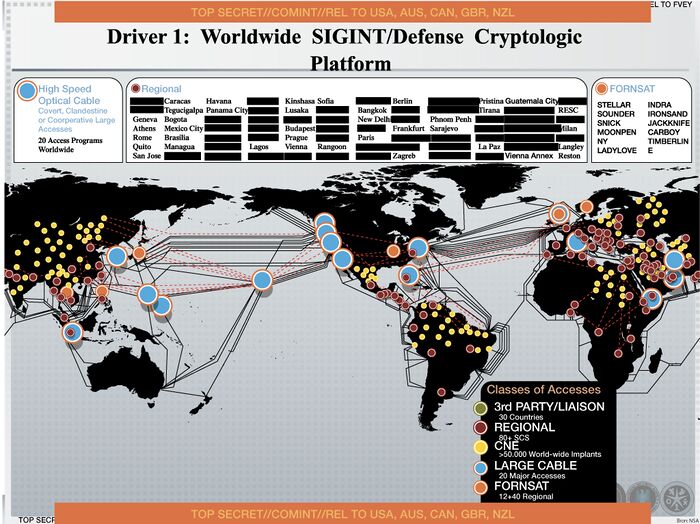
December
According to the classified documents leaked by Snowden, the Australian Signals Directorate (ASD), formerly known as the Defense Signals Directorate, had offered to share intelligence information it had collected with the other intelligence agencies of the UKUSA Agreement. Data shared with foreign countries include "bulk, unselected, unminimized metadata" it had collected. The ASD provided such information on the condition that no Australian citizens were targeted. At the time the ASD assessed that "unintentional collection [of metadata of Australian nationals] is not viewed as a significant issue". If a target was later identified as being an Australian national, the ASD was required to be contacted to ensure that a warrant could be sought. Consideration was given as to whether "medical, legal or religious information" would be automatically treated differently to other types of data, however a decision was made that each agency would make such determinations on a case-by-case basis.[274] Leaked material does not specify where the ASD had collected the intelligence information from, however Section 7(a) of the Intelligence Services Act 2001 (Commonwealth) states that the ASD's role is "...to obtain intelligence about the capabilities, intentions or activities of people or organizations outside Australia...".[275] As such, it is possible ASD's metadata intelligence holdings was focused on foreign intelligence collection and was within the bounds of Australian law.
The Washington Post revealed that the NSA has been tracking the locations of mobile phones from all over the world by tapping into the cables that connect mobile networks globally and that serve U.S. cellphones as well as foreign ones. In the process of doing so, the NSA collects more than five billion records of phone locations on a daily basis. This enables NSA analysts to map cellphone owners' relationships by correlating their patterns of movement over time with thousands or millions of other phone users who cross their paths.[276][277][278][279][280][281][282][283]
The Washington Post also reported that both GCHQ and the NSA make use of location data and advertising tracking files generated through normal internet browsing (with cookies operated by Google, known as "Pref") to pinpoint targets for government hacking and to bolster surveillance.[284][285][286]
The Norwegian Intelligence Service (NIS), which cooperates with the NSA, has gained access to Russian targets in the Kola Peninsula and other civilian targets. In general, the NIS provides information to the NSA about "Politicians", "Energy" and "Armament".[287] A top secret memo of the NSA lists the following years as milestones of the Norway–United States of America SIGINT agreement, or NORUS Agreement:
- 1952 – Informal starting year of cooperation between the NIS and the NSA[288]
- 1954 – Formalization of the agreement[288]
- 1963 – Extension of the agreement for coverage of foreign instrumentation signals intelligence (FISINT)[288]
- 1970 – Extension of the agreement for coverage of electronic intelligence (ELINT)[288]
- 1994 – Extension of the agreement for coverage of communications intelligence (COMINT)[288]
The NSA considers the NIS to be one of its most reliable partners. Both agencies also cooperate to crack the encryption systems of mutual targets. According to the NSA, Norway has made no objections to its requests from the NIS.[288]
On December 5, Sveriges Television reported the National Defense Radio Establishment (FRA) has been conducting a clandestine surveillance operation in Sweden, targeting the internal politics of Russia. The operation was conducted on behalf of the NSA, receiving data handed over to it by the FRA.[289][290] The Swedish-American surveillance operation also targeted Russian energy interests as well as the Baltic states.[291] As part of the UKUSA Agreement, a secret treaty was signed in 1954 by Sweden with the United States, the United Kingdom, Canada, Australia and New Zealand, regarding collaboration and intelligence sharing.[292]
As a result of Snowden's disclosures, the notion of Swedish neutrality in international politics was called into question.[293] In an internal document dating from the year 2006, the NSA acknowledged that its "relationship" with Sweden is "protected at the TOP SECRET level because of that nation's political neutrality."[294] Specific details of Sweden's cooperation with members of the UKUSA Agreement include:
- The FRA has been granted access to XKeyscore, an analytical database of the NSA.[295]
- Sweden updated the NSA on changes in Swedish legislation that provided the legal framework for information sharing between the FRA and the Swedish Security Service.[53]
- Since January 2013, a counterterrorism analyst of the NSA has been stationed in the Swedish capital of Stockholm[53]
- The NSA, GCHQ and the FRA signed an agreement in 2004 that allows the FRA to directly collaborate with the NSA without having to consult GCHQ.[53] About five years later, the Riksdag passed a controversial legislative change, briefly allowing the FRA to monitor both wireless and cable bound signals passing the Swedish border without a court order,[296] while also introducing several provisions designed to protect the privacy of individuals, according to the original proposal.[297] This legislation was amended 11 months later,[298] in an effort to strengthen protection of privacy by making court orders a requirement, and by imposing several limits on the intelligence-gathering.[299][300][301]
According to documents leaked by Snowden, the Special Source Operations of the NSA has been sharing information containing "logins, cookies, and GooglePREFID" with the Tailored Access Operations division of the NSA, as well as Britain's GCHQ agency.[302]
During the 2010 G-20 Toronto summit, the U.S. embassy in Ottawa was transformed into a security command post during a six-day spying operation that was conducted by the NSA and closely coordinated with the Communications Security Establishment Canada (CSEC). The goal of the spying operation was, among others, to obtain information on international development, banking reform, and to counter trade protectionism to support "U.S. policy goals."[303] On behalf of the NSA, the CSEC has set up covert spying posts in 20 countries around the world.[10]
In Italy the Special Collection Service of the NSA maintains two separate surveillance posts in Rome and Milan.[304] According to a secret NSA memo dated September 2010, the Italian embassy in Washington, D.C. has been targeted by two spy operations of the NSA:
- Under the codename "Bruneau", which refers to mission "Lifesaver", the NSA sucks out all the information stored in the embassy's computers and creates electronic images of hard disk drives.[304]
- Under the codename "Hemlock", which refers to mission "Highlands", the NSA gains access to the embassy's communications through physical "implants".[304]
Due to concerns that terrorist or criminal networks may be secretly communicating via computer games, the NSA, GCHQ, CIA, and FBI have been conducting surveillance and scooping up data from the networks of many online games, including massively multiplayer online role-playing games (MMORPGs) such as World of Warcraft, as well as virtual worlds such as Second Life, and the Xbox gaming console.[305][306][307][308]
The NSA has cracked the most commonly used cellphone encryption technology, A5/1. According to a classified document leaked by Snowden, the agency can "process encrypted A5/1" even when it has not acquired an encryption key.[309] In addition, the NSA uses various types of cellphone infrastructure, such as the links between carrier networks, to determine the location of a cellphone user tracked by Visitor Location Registers.[310]
US district court judge for the District of Columbia, Richard Leon, declared[311][312][313][314][315][316] on December 16, 2013, that the mass collection of metadata of Americans' telephone records by the National Security Agency probably violates the fourth amendment prohibition of unreasonable searches and seizures.[317] Leon granted the request for a preliminary injunction that blocks the collection of phone data for two private plaintiffs (Larry Klayman, a conservative lawyer, and Charles Strange, father of a cryptologist killed in Afghanistan when his helicopter was shot down in 2011)[318] and ordered the government to destroy any of their records that have been gathered. But the judge stayed action on his ruling pending a government appeal, recognizing in his 68-page opinion the "significant national security interests at stake in this case and the novelty of the constitutional issues."[317]
However federal judge William H. Pauley III in New York City ruled[319] the U.S. government's global telephone data-gathering system is needed to thwart potential terrorist attacks, and that it can only work if everyone's calls are swept in. U.S. District Judge Pauley also ruled that Congress legally set up the program and that it does not violate anyone's constitutional rights. The judge also concluded that the telephone data being swept up by NSA did not belong to telephone users, but to the telephone companies. He further ruled that when NSA obtains such data from the telephone companies, and then probes into it to find links between callers and potential terrorists, this further use of the data was not even a search under the Fourth Amendment. He also concluded that the controlling precedent is Smith v. Maryland: "Smith's bedrock holding is that an individual has no legitimate expectation of privacy in information provided to third parties," Judge Pauley wrote.[320][321][322][323] The American Civil Liberties Union declared on January 2, 2012 that it will appeal Judge Pauley's ruling that NSA bulk the phone record collection is legal. "The government has a legitimate interest in tracking the associations of suspected terrorists, but tracking those associations does not require the government to subject every citizen to permanent surveillance," deputy ACLU legal director Jameel Jaffer said in a statement.[324]
In recent years, American and British intelligence agencies conducted surveillance on more than 1,100 targets, including the office of an Israeli prime minister, heads of international aid organizations, foreign energy companies and a European Union official involved in antitrust battles with American technology businesses.[325]
A catalog of high-tech gadgets and software developed by the NSA's Tailored Access Operations (TAO) was leaked by the German news magazine Der Spiegel.[326] Dating from 2008, the catalog revealed the existence of special gadgets modified to capture computer screenshots and USB flash drives secretly fitted with radio transmitters to broadcast stolen data over the airwaves, and fake base stations intended to intercept mobile phone signals, as well as many other secret devices and software implants listed here:
SPARROW II – Mobile device that functions as a WLAN collection system
FIREWALK – Hardware implant for collection of Gigabit Ethernet network traffic
IRATEMONK – Replaces master boot records (MBRs) of various hard disk manufacturers
SWAP – Exploits motherboard BIOS before the operating system loads
WISTFULTOLL – Software implant that exploits Windows Management Instrumentation (WMI) to transfer data
HOWLERMONKEY – Short to medium range radio frequency (RF) transceiver
NIGHTSTAND – Mobile device that introduces NSA software to computers up to 8 mi (13 km) away via Wireless LAN
COTTONMOUTH-I – USB flash drive implant
JUNIORMINT – Digital core packaged into a printed circuit board (PCB) and a flip chip
MAESTRO-II – Miniaturized digital core packaged into a multi-chip module (MCM)
TRINITY – Miniaturized digital core packaged into a multi-chip module (MCM)
SOMBERKNAVE – Software implant for Windows XP that provides covert Internet access for the NSA's targets
SURLYSPAWN – Device for keystroke logging
RAGEMASTER – Hardware implant concealed in a computer's VGA cable to capture screenshots and video
IRONCHEF – Software implant that functions as a permanent BIOS system
DEITYBOUNCE – Software implant for insertion into Dell PowerEdge servers
HALLUXWATER – Installs a backdoor targeting Huawei's Eudemon firewalls
FEEDTROUGH – Installs a backdoor targeting numerous Juniper Networks firewalls
GOURMETTROUGH – Installs a backdoor targeting numerous Juniper Networks firewalls
CTX4000 – Portable continuous-wave radar (CRW) unit to illuminate a target system for Dropmire collection
TAWDRYYARD – Device that functions as a radio frequency (RF) retroreflector
PICASSO – Modified GSM handset
GENESIS – Modified Motorola SLVR L9 handset
CROSSBEAM – GSM module for commercial mobile phones
CANDYGRAM – Mimics the GMS cell tower of targeted networks
GOPHERSET – Software implant for GSM subscriber identity module (SIM) cards that pulls out address books, SMS (Short Message Service) text messages, and call log information
MONKEYCALENDAR – Software implant for GSM subscriber identity module (SIM) cards that pulls out geolocation information
TOTECHASER – Windows CE implant that targets the Thuraya handset
TOTEGHOSTLY 2.0 – Software implant for Windows Mobile capable of retrieving SMS (Short Message Service) text messages, Voicemail and contact lists, as well as turning on built-in microphones and cameras
The Tailored Access Operations (TAO) division of the NSA intercepted the shipping deliveries of computers and laptops in order to install spyware and physical implants on electronic gadgets. This was done in close cooperation with the FBI and the CIA.[326][327][328][329][330][331][332] NSA officials responded to the Spiegel reports with a statement, which said: "Tailored Access Operations is a unique national asset that is on the front lines of enabling NSA to defend the nation and its allies. [TAO's] work is centred on computer network exploitation in support of foreign intelligence collection."[333]
In a separate disclosure unrelated to Snowden, the French Trésor public, which runs a certificate authority, was found to have issued fake certificates impersonating Google in order to facilitate spying on French government employees via man-in-the-middle attacks.[334]
2014
January
The NSA is working to build a powerful quantum computer capable of breaking all types of encryption.[336][337][338][339][340] The effort is part of a US$79.7 million research program known as "Penetrating Hard Targets". It involves extensive research carried out in large, shielded rooms known as Faraday cages, which are designed to prevent electromagnetic radiation from entering or leaving.[337] Currently, the NSA is close to producing basic building blocks that will allow the agency to gain "complete quantum control on two semiconductor qubits".[337] Once a quantum computer is successfully built, it would enable the NSA to unlock the encryption that protects data held by banks, credit card companies, retailers, brokerages, governments and health care providers.[336]
According to The New York Times, the NSA is monitoring approximately 100,000 computers worldwide with spy software named Quantum. Quantum enables the NSA to conduct surveillance on those computers on the one hand, and can also create a digital highway for launching cyberattacks on the other hand. Among the targets are the Chinese and Russian military, but also trade institutions within the European Union. The NYT also reported that the NSA can access and alter computers which are not connected with the internet by a secret technology in use by the NSA since 2008. The prerequisite is the physical insertion of the radio frequency hardware by a spy, a manufacturer or an unwitting user. The technology relies on a covert channel of radio waves that can be transmitted from tiny circuit boards and USB cards inserted surreptitiously into the computers. In some cases, they are sent to a briefcase-size relay station that intelligence agencies can set up miles away from the target. The technology can also transmit malware back to the infected computer.[42]
Channel 4 and The Guardian revealed the existence of Dishfire, a massive database of the NSA that collects hundreds of millions of text messages on a daily basis.[341] GCHQ has been given full access to the database, which it uses to obtain personal information of Britons by exploiting a legal loophole.[342]
Each day, the database receives and stores the following amounts of data:
- Geolocation data of more than 76,000 text messages and other travel information[343]
- Over 110,000 names, gathered from electronic business cards[343]
- Over 800,000 financial transactions that are either gathered from text-to-text payments or by linking credit cards to phone users[343]
- Details of 1.6 million border crossings based on the interception of network roaming alerts[343]
- Over 5 million missed call alerts[343]
- About 200 million text messages from around the world[341]
The database is supplemented with an analytical tool known as the Prefer program, which processes SMS messages to extract other types of information including contacts from missed call alerts.[343]
The Privacy and Civil Liberties Oversight Board report on mass surveillance was released on January 23, 2014. It recommends to end the bulk telephone metadata, i.e., bulk phone records – phone numbers dialed, call times and durations, but not call content collection – collection program, to create a "Special Advocate" to be involved in some cases before the FISA court judge and to release future and past FISC decisions "that involve novel interpretations of FISA or other significant questions of law, technology or compliance."[344][345][346]
According to a joint disclosure by The New York Times, The Guardian, and ProPublica,[347][348][349][350][351] the NSA and GCHQ have begun working together to collect and store data from dozens of smartphone application software by 2007 at the latest. A 2008 GCHQ report, leaked by Snowden asserts that "anyone using Google Maps on a smartphone is working in support of a GCHQ system". The NSA and GCHQ have traded recipes for various purposes such as grabbing location data and journey plans that are made when a target uses Google Maps, and vacuuming up address books, buddy lists, phone logs and geographic data embedded in photos posted on the mobile versions of numerous social networks such as Facebook, Flickr, LinkedIn, Twitter and other services. In a separate 20-page report dated 2012, GCHQ cited the popular smartphone game "Angry Birds" as an example of how an application could be used to extract user data. Taken together, such forms of data collection would allow the agencies to collect vital information about a user's life, including his or her home country, current location (through geolocation), age, gender, ZIP code, marital status, income, ethnicity, sexual orientation, education level, number of children, etc.[352][353]
A GCHQ document dated August 2012 provided details of the Squeaky Dolphin surveillance program, which enables GCHQ to conduct broad, real-time monitoring of various social media features and social media traffic such as YouTube video views, the Like button on Facebook, and Blogspot/Blogger visits without the knowledge or consent of the companies providing those social media features. The agency's "Squeaky Dolphin" program can collect, analyze and utilize YouTube, Facebook and Blogger data in specific situations in real time for analysis purposes. The program also collects the addresses from the billions of videos watched daily as well as some user information for analysis purposes.[354][355][356]
During the 2009 United Nations Climate Change Conference in Copenhagen, the NSA and its Five Eyes partners monitored the communications of delegates of numerous countries. This was done to give their own policymakers a negotiating advantage.[357][358]
The Communications Security Establishment Canada (CSEC) has been tracking Canadian air passengers via free Wi-Fi services at a major Canadian airport. Passengers who exited the airport terminal continued to be tracked as they showed up at other Wi-Fi locations across Canada. In a CSEC document dated May 2012, the agency described how it had gained access to two communications systems with over 300,000 users in order to pinpoint a specific imaginary target. The operation was executed on behalf of the NSA as a trial run to test a new technology capable of tracking down "any target that makes occasional forays into other cities/regions." This technology was subsequently shared with Canada's Five Eyes partners – Australia, New Zealand, Britain, and the United States.[359][360][361][362]
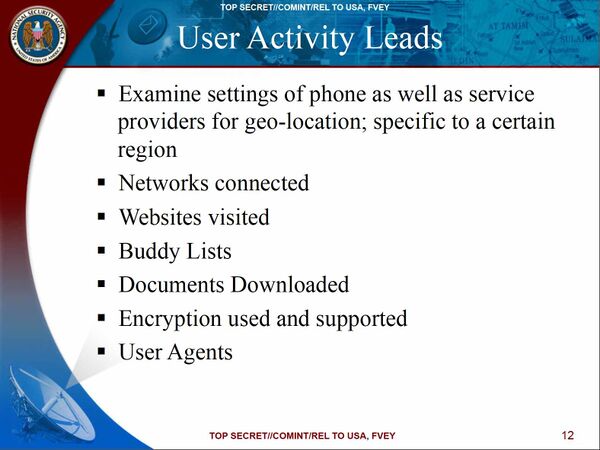
February
According to research by Süddeutsche Zeitung and TV network NDR the mobile phone of former German chancellor Gerhard Schröder was monitored from 2002 onwards, reportedly because of his government's opposition to military intervention in Iraq. The source of the latest information is a document leaked by Edward Snowden. The document, containing information about the National Sigint Requirement List (NSRL), had previously been interpreted as referring only to Angela Merkel's mobile. However Süddeutsche Zeitung and NDR claim to have confirmation from NSA insiders that the surveillance authorisation pertains not to the individual, but the political post – which in 2002 was still held by Schröder. According to research by the two media outlets, Schröder was placed as number 388 on the list, which contains the names of persons and institutions to be put under surveillance by the NSA.[363][364][365][366]
GCHQ launched a cyber-attack on the activist network "Anonymous", using denial-of-service attack (DoS) to shut down a chatroom frequented by the network's members and to spy on them. The attack, dubbed Rolling Thunder, was conducted by a GCHQ unit known as the Joint Threat Research Intelligence Group (JTRIG). The unit successfully uncovered the true identities of several Anonymous members.[367][368][369][370]
The NSA Section 215 bulk telephony metadata program which seeks to stockpile records on all calls made in the U.S. is collecting less than 30 percent of all Americans' call records because of an inability to keep pace with the explosion in cellphone use according to the Washington Post. The controversial program permits the NSA after a warrant granted by the secret Foreign Intelligence Surveillance Court to record numbers, length and location of every call from the participating carriers.[371][372]
The Intercept reported that the U.S. government is using primarily NSA surveillance to target people for drone strikes overseas. In its report The Intercept author detail the flawed methods which are used to locate targets for lethal drone strikes, resulting in the deaths of innocent people.[373] According to the Washington Post NSA analysts and collectors i.e. NSA personnel which controls electronic surveillance equipment use the NSA's sophisticated surveillance capabilities to track individual targets geographically and in real time, while drones and tactical units aimed their weaponry against those targets to take them out.[374]
An unnamed US law firm, reported to be Mayer Brown, was targeted by Australia's ASD. According to Snowden's documents, the ASD had offered to hand over these intercepted communications to the NSA. This allowed government authorities to be "able to continue to cover the talks, providing highly useful intelligence for interested US customers".[375][376]
NSA and GCHQ documents revealed that the anti-secrecy organization WikiLeaks and other activist groups were targeted for government surveillance and criminal prosecution. In particular, the IP addresses of visitors to WikiLeaks were collected in real time, and the US government urged its allies to file criminal charges against the founder of WikiLeaks, Julian Assange, due to his organization's publication of the Afghanistan war logs. The WikiLeaks organization was designated as a "malicious foreign actor".[377]
Quoting an unnamed NSA official in Germany, Bild am Sonntag reported that whilst President Obama's order to stop spying on Merkel was being obeyed, the focus had shifted to bugging other leading government and business figures including Interior Minister Thomas de Maiziere, a close confidant of Merkel. Caitlin Hayden, a security adviser to President Obama, was quoted in the newspaper report as saying, "The US has made clear it gathers intelligence in exactly the same way as any other states."[378][379]
The Intercept reveals that government agencies are infiltrating online communities and engaging in "false flag operations" to discredit targets among them people who have nothing to do with terrorism or national security threats. The two main tactics that are currently used are the injection of all sorts of false material onto the internet in order to destroy the reputation of its targets; and the use of social sciences and other techniques to manipulate online discourse and activism to generate outcomes it considers desirable.[380][381][382][383]
The Guardian reported that Britain's surveillance agency GCHQ, with aid from the National Security Agency, intercepted and stored the webcam images of millions of internet users not suspected of wrongdoing. The surveillance program codenamed Optic Nerve collected still images of Yahoo webcam chats (one image every five minutes) in bulk and saved them to agency databases. The agency discovered "that a surprising number of people use webcam conversations to show intimate parts of their body to the other person", estimating that between 3% and 11% of the Yahoo webcam imagery harvested by GCHQ contains "undesirable nudity".[384]
March
The NSA has built an infrastructure which enables it to covertly hack into computers on a mass scale by using automated systems that reduce the level of human oversight in the process. The NSA relies on an automated system codenamed TURBINE which in essence enables the automated management and control of a large network of implants (a form of remotely transmitted malware on selected individual computer devices or in bulk on tens of thousands of devices). As quoted by The Intercept, TURBINE is designed to "allow the current implant network to scale to large size (millions of implants) by creating a system that does automated control implants by groups instead of individually."[385] The NSA has shared many of its files on the use of implants with its counterparts in the so-called Five Eyes surveillance alliance – the United Kingdom, Canada, New Zealand, and Australia.
Among other things due to TURBINE and its control over the implants the NSA is capable of:
- breaking into targeted computers and to siphoning out data from foreign Internet and phone networks
- infecting a target's computer and exfiltrating files from a hard drive
- covertly recording audio from a computer's microphone and taking snapshots with its webcam
- launching cyberattacks by corrupting and disrupting file downloads or denying access to websites
- exfiltrating data from removable flash drives that connect to an infected computer
The TURBINE implants are linked to, and relies upon, a large network of clandestine surveillance "sensors" that the NSA has installed at locations across the world, including the agency's headquarters in Maryland and eavesdropping bases used by the agency in Misawa, Japan and Menwith Hill, England. Codenamed as TURMOIL, the sensors operate as a sort of high-tech surveillance dragnet, monitoring packets of data as they are sent across the Internet. When TURBINE implants exfiltrate data from infected computer systems, the TURMOIL sensors automatically identify the data and return it to the NSA for analysis. And when targets are communicating, the TURMOIL system can be used to send alerts or "tips" to TURBINE, enabling the initiation of a malware attack. To identify surveillance targets, the NSA uses a series of data "selectors" as they flow across Internet cables. These selectors can include email addresses, IP addresses, or the unique "cookies" containing a username or other identifying information that are sent to a user's computer by websites such as Google, Facebook, Hotmail, Yahoo, and Twitter, unique Google advertising cookies that track browsing habits, unique encryption key fingerprints that can be traced to a specific user, and computer IDs that are sent across the Internet when a Windows computer crashes or updates.[385][386][387][388][389][390][391][392][393][394][395][396][397][398][399][400]
The CIA was accused by U.S. Senate Intelligence Committee Chairwoman Dianne Feinstein of spying on a stand-alone computer network established for the committee in its investigation of allegations of CIA abuse in a George W. Bush-era detention and interrogation program.[401]
A voice interception program codenamed MYSTIC began in 2009. Along with RETRO, short for "retrospective retrieval" (RETRO is voice audio recording buffer that allows retrieval of captured content up to 30 days into the past), the MYSTIC program is capable of recording "100 percent" of a foreign country's telephone calls, enabling the NSA to rewind and review conversations up to 30 days and the relating metadata. With the capability to store up to 30 days of recorded conversations MYSTIC enables the NSA to pull an instant history of the person's movements, associates and plans.[402][403][404][405][406][407]
On March 21, Le Monde published slides from an internal presentation of the Communications Security Establishment Canada, which attributed a piece of malicious software to French intelligence. The CSEC presentation concluded that the list of malware victims matched French intelligence priorities and found French cultural reference in the malware's code, including the name Babar, a popular French children's character, and the developer name "Titi".[408]
The French telecommunications corporation Orange S.A. shares its call data with the French intelligence agency DGSE, which hands over the intercepted data to GCHQ.[409]
The NSA has spied on the Chinese technology company Huawei.[410][411][412] Huawei is a leading manufacturer of smartphones, tablets, mobile phone infrastructure, and WLAN routers and installs fiber optic cable. According to Der Spiegel this "kind of technology […] is decisive in the NSA's battle for data supremacy."[413] The NSA, in an operation named "Shotgiant", was able to access Huawei's email archive and the source code for Huawei's communications products.[413] The US government has had longstanding concerns that Huawei may not be independent of the People's Liberation Army and that the Chinese government might use equipment manufactured by Huawei to conduct cyberespionage or cyberwarfare. The goals of the NSA operation were to assess the relationship between Huawei and the PLA, to learn more the Chinese government's plans and to use information from Huawei to spy on Huawei's customers, including Iran, Afghanistan, Pakistan, Kenya, and Cuba. Former Chinese President Hu Jintao, the Chinese Trade Ministry, banks, as well as telecommunications companies were also targeted by the NSA.[410][413]
The Intercept published a document of an NSA employee discussing how to build a database of IP addresses, webmail, and Facebook accounts associated with system administrators so that the NSA can gain access to the networks and systems they administer.[414][415]
At the end of March 2014, Der Spiegel and The Intercept published, based on a series of classified files from the archive provided to reporters by NSA whistleblower Edward Snowden, articles related to espionage efforts by GCHQ and NSA in Germany.[416][417] The British GCHQ targeted three German internet firms for information about Internet traffic passing through internet exchange points, important customers of the German internet providers, their technology suppliers as well as future technical trends in their business sector and company employees.[416][417] The NSA was granted by the Foreign Intelligence Surveillance Court the authority for blanket surveillance of Germany, its people and institutions, regardless whether those affected are suspected of having committed an offense or not, without an individualized court order specifying on March 7, 2013.[417] In addition Germany's chancellor Angela Merkel was listed in a surveillance search machine and database named Nymrod along with 121 others foreign leaders.[416][417] As The Intercept wrote: "The NSA uses the Nymrod system to 'find information relating to targets that would otherwise be tough to track down,' according to internal NSA documents. Nymrod sifts through secret reports based on intercepted communications as well as full transcripts of faxes, phone calls, and communications collected from computer systems. More than 300 'cites' for Merkel are listed as available in intelligence reports and transcripts for NSA operatives to read."[416]
April
Towards the end of April, Edward Snowden said that the United States surveillance agencies spy on Americans more than anyone else in the world, contrary to anything that has been said by the government up until this point.[418]
May
An article published by Ars Technica shows NSA's Tailored Access Operations (TAO) employees intercepting a Cisco router.[419]
The Intercept and WikiLeaks revealed information about which countries were having their communications collected as part of the MYSTIC surveillance program. On May 19, The Intercept reported that the NSA is recording and archiving nearly every cell phone conversation in the Bahamas with a system called SOMALGET, a subprogram of MYSTIC. The mass surveillance has been occurring without the Bahamian government's permission.[420] Aside from the Bahamas, The Intercept reported NSA interception of cell phone metadata in Kenya, the Philippines, Mexico and a fifth country it did not name due to "credible concerns that doing so could lead to increased violence." WikiLeaks released a statement on May 23 claiming that Afghanistan was the unnamed nation.[421]
In a statement responding to the revelations, the NSA said "the implication that NSA's foreign intelligence collection is arbitrary and unconstrained is false."[420]
Through its global surveillance operations the NSA exploits the flood of images included in emails, text messages, social media, videoconferences and other communications to harvest millions of images. These images are then used by the NSA in sophisticated facial recognition programs to track suspected terrorists and other intelligence targets.[422]
June
Vodafone revealed that there were secret wires that allowed government agencies direct access to their networks.[423] This access does not require warrants and the direct access wire is often equipment in a locked room.[423] In six countries where Vodafone operates, the law requires telecommunication companies to install such access or allows governments to do so.[423] Vodafone did not name these countries in case some governments retaliated by imprisoning their staff.[423] Shami Chakrabarti of Liberty said "For governments to access phone calls at the flick of a switch is unprecedented and terrifying. Snowden revealed the internet was already treated as fair game. Bluster that all is well is wearing pretty thin – our analogue laws need a digital overhaul."[423] Vodafone published its first Law Enforcement Disclosure Report on June 6, 2014.[423] Vodafone group privacy officer Stephen Deadman said "These pipes exist, the direct access model exists. We are making a call to end direct access as a means of government agencies obtaining people's communication data. Without an official warrant, there is no external visibility. If we receive a demand we can push back against the agency. The fact that a government has to issue a piece of paper is an important constraint on how powers are used."[423] Gus Hosein, director of Privacy International said "I never thought the telcos would be so complicit. It's a brave step by Vodafone and hopefully the other telcos will become more brave with disclosure, but what we need is for them to be braver about fighting back against the illegal requests and the laws themselves."[423]
Above-top-secret documentation of a covert surveillance program named Overseas Processing Centre 1 (OPC-1) (codenamed "CIRCUIT") by GCHQ was published by The Register. Based on documents leaked by Edward Snowden, GCHQ taps into undersea fiber optic cables via secret spy bases near the Strait of Hormuz and Yemen. BT and Vodafone are implicated.[424]
The Danish newspaper Dagbladet Information and The Intercept revealed on June 19, 2014, the NSA mass surveillance program codenamed RAMPART-A. Under RAMPART-A, 'third party' countries tap into fiber optic cables carrying the majority of the world's electronic communications and are secretly allowing the NSA to install surveillance equipment on these fiber-optic cables. The foreign partners of the NSA turn massive amounts of data like the content of phone calls, faxes, e-mails, internet chats, data from virtual private networks, and calls made using Voice over IP software like Skype over to the NSA. In return these partners receive access to the NSA's sophisticated surveillance equipment so that they too can spy on the mass of data that flows in and out of their territory. Among the partners participating in the NSA mass surveillance program are Denmark and Germany.[425][426][427]
July
During the week of July 4, a 31-year-old male employee of Germany's intelligence service BND was arrested on suspicion of spying for the United States. The employee is suspected of spying on the German Parliamentary Committee investigating the NSA spying scandal.[428]
Former NSA official and whistleblower William Binney spoke at a Centre for Investigative Journalism conference in London. According to Binney, "at least 80% of all audio calls, not just metadata, are recorded and stored in the US. The NSA lies about what it stores." He also stated that the majority of fiber optic cables run through the U.S., which "is no accident and allows the US to view all communication coming in."[429]
The Washington Post released a review of a cache provided by Snowden containing roughly 160,000 text messages and e-mails intercepted by the NSA between 2009 and 2012. The newspaper concluded that nine out of ten account holders whose conversations were recorded by the agency "were not the intended surveillance targets but were caught in a net the agency had cast for somebody else." In its analysis, The Post also noted that many of the account holders were Americans.[430]
On July 9, a soldier working within Germany's Federal Ministry of Defence (BMVg) fell under suspicion of spying for the United States.[431] As a result of the July 4 case and this one, the German government expelled the CIA station chief in Germany on July 17.[432]
On July 18, former State Department official John Tye released an editorial in The Washington Post, highlighting concerns over data collection under Executive Order 12333. Tye's concerns are rooted in classified material he had access to through the State Department, though he has not publicly released any classified materials.[433]
August
The Intercept reported that the NSA is "secretly providing data to nearly two dozen U.S. government agencies with a 'Google-like' search engine" called ICREACH. The database, The Intercept reported, is accessible to domestic law enforcement agencies including the FBI and the Drug Enforcement Administration and was built to contain more than 850 billion metadata records about phone calls, emails, cellphone locations, and text messages.[434][435]
2015
February
Based on documents obtained from Snowden, The Intercept reported that the NSA and GCHQ had broken into the internal computer network of Gemalto and stolen the encryption keys that are used in SIM cards no later than 2010. اعتبارا من 2015[تحديث], the company is the world's largest manufacturer of SIM cards, making about two billion cards a year. With the keys, the intelligence agencies could eavesdrop on cell phones without the knowledge of mobile phone operators or foreign governments.[436]
March
The New Zealand Herald, in partnership with The Intercept, revealed that the New Zealand government used XKeyscore to spy on candidates for the position of World Trade Organization director general[437] and also members of the Solomon Islands government.[438]
April
In January 2015, the DEA revealed that it had been collecting metadata records for all telephone calls made by Americans to 116 countries linked to drug trafficking. The DEA's program was separate from the telephony metadata programs run by the NSA.[439] In April, USA Today reported that the DEA's data collection program began in 1992 and included all telephone calls between the United States and from Canada and Mexico. Current and former DEA officials described the program as the precursor of the NSA's similar programs.[440] The DEA said its program was suspended in September 2013, after a review of the NSA's programs and that it was "ultimately terminated."[439]
September
Snowden provided journalists at The Intercept with GCHQ documents regarding another secret program "Karma Police", calling itself "the world's biggest" data mining operation, formed to create profiles on every visible Internet user's browsing habits. By 2009 it had stored over 1.1 trillion web browsing sessions, and by 2012 was recording 50 billion sessions per day.[441]
2016
هذا القسم يحتاج أن يـُحدَّث. (July 2018) |
January
This section requires expansion. (January 2016) |
August
- A group called The Shadow Brokers says it infiltrated NSA's Equation Group and teases files including some named in documents leaked by Edward Snowden.[444] Among the products affected by the leaked material was Cisco PIX and ASA VPN boxes.
2017
هذا القسم يحتاج أن يـُحدَّث. (July 2018) |
In March 2017, WikiLeaks has published more than 8,000 documents on the CIA. The confidential documents, codenamed Vault 7, dated from 2013–2016, included details on the CIA's hacking capabilities, such as the ability to compromise cars, smart TVs,[445] web browsers (including Google Chrome, Microsoft Edge, Firefox, and Opera),[446][447] and the operating systems of most smartphones (including Apple's iOS and Google's Android), as well as other operating systems such as Microsoft Windows, macOS, and Linux.[448] WikiLeaks did not name the source, but said that the files had "circulated among former U.S. government hackers and contractors in an unauthorized manner, one of whom has provided WikiLeaks with portions of the archive."[445]
2018
هذا القسم يحتاج أن يـُحدَّث. (July 2018) |
2019
هذا القسم يحتاج أن يـُحدَّث. (March 2021) |
2020
هذا القسم يحتاج أن يـُحدَّث. (March 2021) |
2021
هذا القسم يحتاج أن يـُحدَّث. (March 2021) |
- In May 2021, it was reported that Danish Defence Intelligence Service collaborated with NSA to wiretap on fellow EU members and leaders, leading to wide backlash among EU countries and demands for explanation from Danish and American governments.[449][450][451]
Reaction
Reactions of citizens
The disclosure provided impetus for the creation of social movements against mass surveillance, such as Restore the Fourth, and actions like Stop Watching Us and The Day We Fight Back. On the legal front, the Electronic Frontier Foundation joined a coalition of diverse groups filing suit against the NSA. Several human rights organizations have urged the Obama administration not to prosecute, but protect, "whistleblower Snowden": Amnesty International, Human Rights Watch, Transparency International, and the Index on Censorship, among others.[452][453][454][455] On the economic front, several consumer surveys registered a drop in online shopping and banking activity as a result of the Snowden revelations.[456]
Reactions of political leaders
United States
Domestically, President Barack Obama claimed that there is "no spying on Americans",[457][458] and White House Press Secretary Jay Carney asserted that the surveillance programs revealed by Snowden have been authorized by Congress.[459]
On the international front, U.S. Attorney General Eric Holder stated that "we cannot target even foreign persons overseas without a valid foreign intelligence purpose."[460]
United Kingdom
Prime Minister David Cameron warned journalists that "if they don't demonstrate some social responsibility it will be very difficult for government to stand back and not to act."[461] Deputy Prime Minister Nick Clegg emphasized that the media should "absolutely defend the principle of secrecy for the intelligence agencies".[462]
Foreign Secretary William Hague claimed that "we take great care to balance individual privacy with our duty to safeguard the public and UK national security."[463] Hague defended the Five Eyes alliance and reiterated that the British-U.S. intelligence relationship must not be endangered because it "saved many lives".[464]
Australia
Former Prime Minister Tony Abbott stated that "every Australian governmental agency, every Australian official at home and abroad, operates in accordance with the law".[465] Abbott criticized the Australian Broadcasting Corporation for being unpatriotic due to its reporting on the documents provided by Snowden, whom Abbott described as a "traitor".[466][467] Foreign Minister Julie Bishop also denounced Snowden as a traitor and accused him of "unprecedented" treachery.[468] Bishop defended the Five Eyes alliance and reiterated that the Australian–U.S. intelligence relationship must not be endangered because it "saves lives".[469]
Germany
In July 2013, Chancellor Angela Merkel defended the surveillance practices of the NSA, and described the United States as "our truest ally throughout the decades".[470][471] After the NSA's surveillance on Merkel was revealed, however, the Chancellor compared the NSA with the Stasi.[472] According to The Guardian, Berlin is using the controversy over NSA spying as leverage to enter the exclusive Five Eyes alliance.[473]
Interior Minister Hans-Peter Friedrich stated that "the Americans take our data privacy concerns seriously."[474] Testifying before the German Parliament, Friedrich defended the NSA's surveillance, and cited five terrorist plots on German soil that were prevented because of the NSA.[475] However, in April 2014, another German interior minister criticized the United States for failing to provide sufficient assurances to Germany that it had reined in its spying tactics. Thomas de Maiziere, a close ally of Merkel, told Der Spiegel: "U.S. intelligence methods may be justified to a large extent by security needs, but the tactics are excessive and over-the-top."[476]
Sweden
Minister for Foreign Affairs Carl Bildt, defended the FRA and described its surveillance practices as a "national necessity".[477] Minister for Defence Karin Enström said that Sweden's intelligence exchange with other countries is "critical for our security" and that "intelligence operations occur within a framework with clear legislation, strict controls and under parliamentary oversight."[478][479]
Netherlands
Interior Minister Ronald Plasterk apologized for incorrectly claiming that the NSA had collected 1.8 million records of metadata in the Netherlands. Plasterk acknowledged that it was in fact Dutch intelligence services who collected the records and transferred them to the NSA.[480][481]
Denmark
The Danish Prime Minister Helle Thorning-Schmidt has praised the American intelligence agencies, claiming they have prevented terrorist attacks in Denmark, and expressed her personal belief that the Danish people "should be grateful" for the Americans' surveillance.[482] She has later claimed that the Danish authorities have no basis for assuming that American intelligence agencies have performed illegal spying activities towards Denmark or Danish interests.[483]
Review of intelligence agencies
- Germany
In July 2013, the German government announced an extensive review of Germany's intelligence services.[484][485]
- United States
In August 2013, the U.S. government announced an extensive review of U.S. intelligence services.[486][487]
- United Kingdom
In October 2013, the British government announced an extensive review of British intelligence services.[488]
- Canada
In December 2013, the Canadian government announced an extensive review of Canada's intelligence services.[489]
Criticism and alternative views
In January 2014, U.S. President Barack Obama said that "the sensational way in which these disclosures have come out has often shed more heat than light"[24] and critics such as Sean Wilentz claimed that "the NSA has acted far more responsibly than the claims made by the leakers and publicized by the press." In Wilentz' view "The leakers have gone far beyond justifiably blowing the whistle on abusive programs. In addition to their alarmism about [U.S.] domestic surveillance, many of the Snowden documents released thus far have had nothing whatsoever to do with domestic surveillance."[25] Edward Lucas, former Moscow bureau chief for The Economist, agreed, asserting that "Snowden's revelations neatly and suspiciously fits the interests of one country: Russia" and citing Masha Gessen's statement that "The Russian propaganda machine has not gotten this much mileage out of a US citizen since Angela Davis's murder trial in 1971."[490]
Bob Cesca objected to The New York Times failing to redact the name of an NSA employee and the specific location where an al Qaeda group was being targeted in a series of slides the paper made publicly available.[491]
Russian journalist Andrei Soldatov argued that Snowden's revelations had had negative consequences for internet freedom in Russia, as Russian authorities increased their own surveillance and regulation on the pretext of protecting the privacy of Russian users. Snowden's name was invoked by Russian legislators who supported measures forcing platforms such as Google, Facebook, Twitter and Gmail and YouTube to locate their servers on Russian soil or install SORM black boxes on their servers so that Russian authorities could control them.[492] Soldatov also contended that as a result of the disclosures, international support for having national governments take over the powers of the organizations involved in coordinating the Internet's global architectures had grown, which could lead to a Balkanization of the Internet that restricted free access to information.[493] The Montevideo Statement on the Future of Internet Cooperation issued in October 2013, by ICANN and other organizations warned against "Internet fragmentation at a national level" and expressed "strong concern over the undermining of the trust and confidence of Internet users globally due to recent revelations".[494]
In late 2014, Freedom House said "[s]ome states are using the revelations of widespread surveillance by the U.S. National Security Agency (NSA) as an excuse to augment their own monitoring capabilities, frequently with little or no oversight, and often aimed at the political opposition and human rights activists."[495]
Gallery
Court order demanding that Verizon hand over all call detail records to NSA.
Presidential Policy Directive – PPD 20 Signed By Barack Obama Relating to Cyberwarfare
A 2008 Presentation of the XKeyscore program. (PDF, 27.3 MB)
Spying against Enrique Peña Nieto and his associates.
Spying effort against Dilma Rousseff and her advisers.
Comparison with other leaks
See also
- Global surveillance whistleblowers
- Communications Assistance for Law Enforcement Act
- Harris Corporation
- PositiveID
References
- ^ Barton Gellman (ديسمبر 24, 2013). "Edward Snowden, after months of NSA revelations, says his mission's accomplished". The Washington Post. Retrieved ديسمبر 25, 2013.
Taken together, the revelations have brought to light a global surveillance system...
- ^ أ ب ت "Who holds security clearances?". The Washington Post. يونيو 10, 2013. Retrieved فبراير 12, 2014.
- ^ Greenwald, Glenn (يونيو 6, 2013). "NSA collecting phone records of millions of Verizon customers daily". The Guardian. Retrieved أغسطس 16, 2013.
Exclusive: Top secret court order requiring Verizon to hand over all call data shows scale of domestic surveillance under Obama
- ^ "NSA Primary Sources". Electronic Frontier Foundation. نوفمبر 19, 2013. Retrieved ديسمبر 14, 2013.
- ^ أ ب ت ث ج ح Hubert Gude; Laura Poitras; Marcel Rosenbach (أغسطس 5, 2013). "German intelligence Sends Massive Amounts of Data to the NSA". Der Spiegel. Retrieved ديسمبر 14, 2013.
- ^ Gunnar Rensfeldt. "NSA 'asking for' specific exchanges from FRA – Secret treaty since 1954". Sveriges Television. Retrieved ديسمبر 14, 2013.
This document, dated 18 April of this year, clearly shows that the relation is very close indeed, seemingly growing even closer. 'NSA's relationship with the FRA, an extremely competent, technically innovative, and trusted Third Party partner, continues to grow. The FRA provided NSA with access to its cable collection in 2011'
- ^ أ ب ت Glenn Greenwald; Laura Poitras; Ewen MacAskill (سبتمبر 11, 2013). "NSA shares raw intelligence including Americans' data with Israel". The Guardian. Retrieved سبتمبر 14, 2013.
- ^ Tim Leslie; Mark Corcoran (نوفمبر 8, 2013). "Explained: Australia's involvement with the NSA, the U.S. spy agency at heart of global scandal". Australian Broadcasting Corporation. Retrieved ديسمبر 18, 2013.
- ^ Julian Borger (نوفمبر 2013). "GCHQ and European spy agencies worked together on mass surveillance". The Guardian. Retrieved ديسمبر 18, 2013.
- ^ أ ب Greg Weston; Glenn Greenwald; Ryan Gallagher. "Snowden document shows Canada set up spy posts for NSA". Canadian Broadcasting Corporation. Retrieved ديسمبر 13, 2013.
- ^ "Denmark is one of the NSA's '9-Eyes'". The Copenhagen Post. Archived from the original on ديسمبر 19, 2013. Retrieved ديسمبر 18, 2013.
- ^ أ ب Jacques Follorou (نوفمبر 29, 2013). "La France, précieux partenaire de l'espionnage de la NSA". Le Monde (in الفرنسية). Retrieved ديسمبر 18, 2013.
- ^ Christian Fuchs, John Goetz und Frederik Obermaier. "Verfassungsschutz beliefert NSA". Süddeutsche Zeitung (in الألمانية). Retrieved ديسمبر 18, 2013.
- ^ Kjetil Malkenes Hovland. "Norway Monitored Phone Traffic and Shared Data With NSA". The Wall Street Journal. Retrieved ديسمبر 18, 2013.
- ^ U.S. vs. Edward J. Snowden criminal complaint. The Washington Post.
- ^ Herszenhorn, David M. (يوليو 16, 2013). "Leaker Files for Asylum to Remain in Russia". The New York Times. Retrieved ديسمبر 16, 2013.
- ^ "Snowden Asylum Hits U.S.-Russia Relations". The Wall Street Journal. أغسطس 1, 2013. Retrieved ديسمبر 16, 2013.
- ^ ".S. 'Extremely Disappointed' At Russia's Asylum For Snowden". NPR. أغسطس 1, 2013. Retrieved ديسمبر 16, 2013.
- ^ "Obama's "Rule of Law" Hypocrisy". Cato Institute (in الإنجليزية). مايو 12, 2020. Retrieved أبريل 28, 2021.
- ^ Henderson. "Obama To Leno: 'There Is No Spying On Americans'". NPR. Retrieved أغسطس 16, 2013.
- ^ Francis Elliott (أكتوبر 28, 2013). "Cameron hints at action to stop security leaks". The Times. Retrieved نوفمبر 13, 2013.
- ^ Satter, Raphael (نوفمبر 13, 2013). "UK Pursuing Criminal Investigation Into Guardian Leaks". Associated Press. Retrieved سبتمبر 23, 2014.
- ^ "Only 1% of Snowden files published – Guardian editor". BBC. ديسمبر 3, 2013. Retrieved ديسمبر 29, 2013.
- ^ أ ب Transcript Of President Obama's Speech On NSA Reforms NPR January 17, 2014
- ^ أ ب Sean Wilentz (January 19, 2014), Would You Feel Differently About Snowden, Greenwald, and Assange If You Knew What They Really Thought? The New Republic
- ^ أ ب ت "Pentagon Says Snowden Took Most U.S. Secrets Ever". Archived from the original on يناير 10, 2014. Retrieved فبراير 1, 2014.
{{cite web}}: CS1 maint: bot: original URL status unknown (link) - ^ أ ب "Snowden leaks 'worst ever loss to British intelligence'". BBC. أكتوبر 11, 2013. Retrieved فبراير 4, 2014.
- ^ أ ب Chan, Edwin (يوليو 11, 2013). "Microsoft helped NSA, FBI access user info: Guardian". Reuters. Retrieved ديسمبر 25, 2013.
- ^ Andy Greenberg (يونيو 5, 2013). "NSA's Verizon Spying Order Specifically Targeted Americans, Not Foreigners". Forbes. Retrieved ديسمبر 25, 2013.
In a top secret order obtained by the Guardian newspaper and published Wednesday evening, the FBI on the NSA's behalf demanded that Verizon turn over all call detail records originating in the United States for the three months beginning in late April and ending on 19 July.
- ^ "Report: NSA and CIA collaborate on drone strikes". Associated Press. أكتوبر 17, 2013. Retrieved ديسمبر 25, 2013.
- ^ Doug Gross (ديسمبر 10, 2013). "Leak: Government spies snooped in 'Warcraft,' other games". CNN. Retrieved ديسمبر 25, 2013.
- ^ Craig Timberg; Barton Gellman (سبتمبر 3, 2013). "NSA paying U.S. companies for access to communications networks". The Washington Post. Retrieved ديسمبر 25, 2013.
- ^ Michael Winter (أغسطس 23, 2013). "NSA reimbursed tech firms millions for data". USA Today. Retrieved ديسمبر 25, 2013.
- ^ Brian Fung. "The NSA paid Silicon Valley millions to spy on taxpayers". The Washington Post. Retrieved ديسمبر 25, 2013.
- ^ Rob Williams (أغسطس 2, 2013). "Americans pay GCHQ £100m to spy for them, leaked NSA papers from Edward Snowden claim". The Independent. London. Retrieved ديسمبر 25, 2013.
- ^ Kiran Stacey (أغسطس 1, 2013). "US paid GCHQ £100m for UK intelligence, say leaked documents". Financial Times. Retrieved ديسمبر 25, 2013.
- ^ "Espionnage: les services secrets français précieux partenaires de la NSA américaine" (in الفرنسية). Radio France Internationale. نوفمبر 30, 2013. Retrieved نوفمبر 30, 2013.
- ^ "SPIEGEL Reveals Cooperation Between NSA and German BND". Der Spiegel. يوليو 8, 2013. Retrieved ديسمبر 25, 2013.
- ^ أ ب Ball, James (نوفمبر 20, 2013). "US and UK struck secret deal to allow NSA to 'unmask' Britons' personal data". The Guardian. Retrieved نوفمبر 21, 2013.
- ^ Philip Dorling (سبتمبر 12, 2013). "US shares raw intelligence on Australians with Israel". The Sydney Morning Herald. Retrieved ديسمبر 25, 2013.
- ^ Ewen MacAskill; James Ball; Katharine Murphy (ديسمبر 2, 2013). "Revealed: Australian spy agency offered to share data about ordinary citizens". The Guardian. Retrieved ديسمبر 25, 2013.
- ^ أ ب ت ث David E.Sanger; Thom Shanker (يناير 14, 2014). "N.S.A. Devises Radio Pathway into Computers". The New York Times. Retrieved يناير 15, 2014.
- ^ أ ب ت Cameron Stewart; Paul Maley (ديسمبر 5, 2013). "Edward Snowden stole up to 20,000 Aussie files". The Australian. Retrieved فبراير 3, 2021.
- ^ Philip Dorling (يونيو 13, 2013). "Australia gets 'deluge' of US secret data, prompting a new data facility". The Sydney Morning Herald. Retrieved ديسمبر 22, 2013.
- ^ Nick Hopkins (يونيو 7, 2013). "UK gathering secret intelligence via covert NSA operation". The Guardian. Retrieved ديسمبر 22, 2013.
- ^ Olmer, Bart. "Ook AIVD bespiedt internetter". De Telegraaf (in الهولندية). Retrieved سبتمبر 10, 2013.
Niet alleen Amerikaanse inlichtingendiensten monitoren internetters wereldwijd. Ook Nederlandse geheime diensten krijgen informatie uit het omstreden surveillanceprogramma 'Prism'.
- ^ أ ب ت Glenn Greenwald, Ewen MacAskill, Laura Poitras, Spencer Ackerman and Dominic Rushe (يوليو 11, 2013). "Revealed: how Microsoft handed the NSA access to encrypted messages". The Guardian. London. Retrieved يوليو 11, 2013.
{{cite news}}: CS1 maint: multiple names: authors list (link) - ^ Brandon Griggs (يوليو 13, 2013). "Report: Microsoft collaborated closely with NSA". CNN. Retrieved ديسمبر 25, 2013.
And Microsoft also worked with the FBI this year to give the NSA easier access to its cloud storage service SkyDrive
- ^ أ ب ت ث ج June 6, Published; 2013; July 10, Updated; 2013. "NSA slides explain the PRISM data-collection program". The Washington Post (in الإنجليزية). Retrieved أكتوبر 7, 2020.
{{cite web}}:|last2=has numeric name (help)CS1 maint: numeric names: authors list (link) - ^ أ ب ت Greenwald, Glenn; MacAskill, Ewen (يونيو 7, 2013). "NSA Prism program taps in to user data of Apple, Google and others". The Guardian. Retrieved ديسمبر 25, 2015.
- ^ أ ب ت René Pfister, Laura Poitras, Marcel Rosenbach, Jörg Schindler and Holger Stark. "German Intelligence Worked Closely with NSA on Data Surveillance". Der Spiegel. Retrieved ديسمبر 22, 2013.
{{cite web}}: CS1 maint: multiple names: authors list (link) - ^ Gunnar Rensfeldt. "FRA has access to controversial surveillance system". Sveriges Television. Retrieved ديسمبر 12, 2013.
- ^ أ ب ت ث Gunnar Rensfeldt. "Read the Snowden Documents From the NSA". Sveriges Television. Retrieved ديسمبر 12, 2013.
- ^ Nick Hopkins; Julian Borger (أغسطس 1, 2013). "Exclusive: NSA pays £100m in secret funding for GCHQ". The Guardian. Retrieved ديسمبر 22, 2013.
- ^ Rob Williams (أغسطس 2, 2013). "Americans pay GCHQ £100m to spy for them, leaked NSA papers from Edward Snowden claim". The Independent. London. Retrieved ديسمبر 31, 2013.
- ^ أ ب ت ث ج ح خ د ذ ر ز س ش ص James Ball; Luke Harding; Juliette Garside (أغسطس 2, 2013). "BT and Vodafone among telecoms companies passing details to GCHQ". The Guardian. Retrieved ديسمبر 22, 2013.
- ^ Gellman, Barton; Soltani, Ashkan; Peterson, Andrea (نوفمبر 4, 2013). "How we know the NSA had access to internal Google and Yahoo cloud data". The Washington Post. Retrieved نوفمبر 5, 2013.
- ^ Matthias Gebauer; Hubert Gude; Veit Medick; Jörg Schindler; Fidelius Schmid. "CIA Worked With BND and BfV in Neuss on Secret Project". Der Spiegel. Retrieved ديسمبر 20, 2013.
- ^ Philip Dorling (أكتوبر 31, 2013). "Exposed: Australia's Asia spy network". The Sydney Morning Herald. Retrieved ديسمبر 23, 2013.
- ^ أ ب ت ث "Photo Gallery: Spies in the Embassy". Der Spiegel. Retrieved ديسمبر 22, 2013.
- ^ Colin Freeze (أكتوبر 29, 2013). "Canadian embassies eavesdrop, leak says". The Globe and Mail. Toronto. Retrieved ديسمبر 23, 2013.
- ^ أ ب Duncan Campbell; Cahal Milmo; Kim Sengupta; Nigel Morris; Tony Patterson (نوفمبر 5, 2013). "Revealed: Britain's 'secret listening post in the heart of Berlin'". The Independent. London. Retrieved ديسمبر 22, 2013.
- ^ Duncan Campbell; Cahal Milmo (نوفمبر 5, 2013). "Exclusive: RAF Croughton base 'sent secrets from Merkel's phone straight to the CIA'". The Independent. London. Retrieved ديسمبر 25, 2013.
- ^ أ ب ت ث Jacques Follorou (أكتوبر 30, 2013). "Surveillance : la DGSE a transmis des données à la NSA américaine". Le Monde (in الفرنسية). Retrieved ديسمبر 30, 2013.
- ^ أ ب ت "Espionnage : la France aurait collaboré avec la NSA". Le Parisien. أكتوبر 29, 2013. Retrieved ديسمبر 30, 2013.
- ^ "NSA files decoded: Edward Snowden's surveillance revelations explained". نوفمبر 2013.
- ^ Ewen MacAskill; Dominic Rushe (نوفمبر 2013). "Snowden document reveals key role of companies in NSA data collection". The Guardian. Retrieved ديسمبر 22, 2013.
- ^ "David Miranda row: Seized files 'endanger agents'". BBC. أغسطس 30, 2013. Retrieved فبراير 1, 2014.
- ^ Leopold, Jason (يونيو 4, 2015). "Exclusive: Inside Washington's Quest to Bring Down Edward Snowden". Vice News. Retrieved يونيو 4, 2015.
- ^ Corera, Gordon (أكتوبر 29, 2013). "Spying scandal: Will the 'five eyes' club open up?". BBC. Retrieved فبراير 1, 2014.
- ^ Risen, James (أكتوبر 17, 2013). "Snowden Says He Took No Secret Files to Russia". The New York Times. Retrieved فبراير 1, 2014.
- ^ Timothy Heritage; Steve Holland (أغسطس 1, 2013). "Russia gives Snowden asylum, Obama-Putin summit in doubt". Reuters. Retrieved فبراير 1, 2014.
- ^ "U.S. Electronic Espionage: A Memoir". Ramparts. أغسطس 1972. pp. 35–50.
The SIGINT community was defined by a TOP SECRET treaty signed in 1947. It was called the UKUSA treaty. The National Security Agency signed for the U.S. and became what's called First Party to the Treaty.
- ^ Campbell, Duncan (أغسطس 12, 1988). "Somebody's Listening". New Statesman. Archived from the original on أبريل 20, 2013.
The Congressional officials were first told of the Thurmond interception by a former employee of the Lockheed Space and Missiles Corporation, Margaret Newsham, who now lives in Sunnyvale, California.
- ^ "Shayler: Whistleblower or traitor?". BBC. مارس 3, 2000. Retrieved ديسمبر 28, 2013.
- ^ JOSEPH FINDER (أبريل 29, 2001). "Bugging the World". The New York Times. Retrieved ديسمبر 28, 2013.
- ^ "NSA Whistleblowers William (Bill) Binney and J. Kirk Wiebe". Government Accountability Project. Archived from the original on ديسمبر 12, 2013.
- ^ Ellen Nakashima (يوليو 14, 2010). "Former NSA executive Thomas A. Drake may pay high price for media leak". The Washington Post. Retrieved ديسمبر 28, 2013.
- ^ Davies, Ben (نوفمبر 27, 2003). "Interview: Whistleblower Katharine Gun". BBC. Retrieved ديسمبر 28, 2013.
- ^ "UK 'spied on UN's Kofi Annan'". BBC. فبراير 26, 2004. Retrieved ديسمبر 28, 2013.
- ^ JAMES RISEN; ERIC LICHTBLAU (ديسمبر 16, 2005). "Bush Lets U.S. Spy on Callers Without Courts". The New York Times. Retrieved أبريل 11, 2015.
- ^ Brian Ross (يناير 10, 2006). "NSA Whistleblower Alleges Illegal Spying". ABC News. Retrieved ديسمبر 28, 2013.
- ^ Leslie Cauley (مايو 11, 2006). "NSA has massive database of Americans' phone calls". USA Today. Retrieved أبريل 11, 2015.
- ^ "Wiretap Whistle-Blower's Account". Wired. أبريل 6, 2006. Archived from the original on يناير 17, 2014. Retrieved ديسمبر 28, 2013.
- ^ "Wikileaks disclosure shines light on Big Brother". CBS News. ديسمبر 1, 2011. Retrieved أبريل 11, 2015.
- ^ Michael Hastings (فبراير 28, 2012). "Exclusive: Homeland Security Kept Tabs on Occupy Wall Street". Rolling Stone. Retrieved يناير 5, 2014.
- ^ أ ب Greenslade, Roy (أغسطس 19, 2013). "How Edward Snowden led journalist and film-maker to reveal NSA secrets". The Guardian. Retrieved أغسطس 20, 2013.
- ^ Mark Hosenball (August 15, 2013), Snowden downloaded NSA secrets while working for Dell, sources say Reuters
- ^ Carmon, Irin (يونيو 10, 2013). "How we broke the NSA story". Salon. Archived from the original on يونيو 15, 2013. Retrieved يونيو 11, 2013.
- ^ Peter Maass (August 18, 2013), "How Laura Poitras Helped Snowden Spill His Secrets". The New York Times
- ^ Greenwald, Glenn; MacAskill, Ewen; Poitras, Laura (يونيو 9, 2013). "Edward Snowden: the whistleblower behind the NSA surveillance revelations". The Guardian. London. Retrieved يونيو 9, 2013.
- ^ Smith, Matt; Pearson, Michael (يونيو 10, 2013). "NSA leaker holed up in Hong Kong hotel, running low on cash". CNN. Retrieved يونيو 10, 2013.
- ^ "Everything We Learned from Edward Snowden in 2013". National Journal.
- ^ أ ب Glenn Greenwald (يونيو 6, 2013). "NSA collecting phone records of millions of Verizon customers daily". The Guardian. London. Retrieved سبتمبر 16, 2013.
- ^ Danny Yadron; Evan Perez (يونيو 14, 2013). "T-Mobile, Verizon Wireless Shielded from NSA Sweep". The Wall Street Journal. Retrieved فبراير 10, 2014.
- ^ Gellman, Barton; Poitras, Laura (يونيو 6, 2013). "US Intelligence Mining Data from Nine U.S. Internet Companies in Broad Secret Program". The Washington Post. Retrieved يونيو 15, 2013.
- ^ Greenwald, Glenn; MacAskill, Ewen (يونيو 6, 2013). "NSA Taps in to Internet Giants' Systems to Mine User Data, Secret Files Reveal – Top-Secret Prism Program Claims Direct Access to Servers of Firms Including Google, Apple and Facebook – Companies Deny Any Knowledge of Program in Operation Since 2007 – Obama Orders US to Draw Up Overseas Target List for Cyber-Attacks". The Guardian. London. Retrieved يونيو 15, 2013.
- ^ "NSA slides explain the PRISM data-collection program". The Washington Post. يونيو 6, 2013. Retrieved فبراير 11, 2014.
- ^ Barton Gellman; Todd Lindeman (يونيو 29, 2013). "Inner workings of a top-secret spy program". The Washington Post. Retrieved فبراير 11, 2014.
- ^ Gellman, Barton; Poitras, Laura (يونيو 7, 2013). "U.S., British intelligence mining data from nine U.S. Internet companies in broad secret program". The Washington Post. Archived from the original on أغسطس 24, 2013. Retrieved أغسطس 20, 2013.
- ^ Laura Poitras, Marcel Rosenbach, Fidelius Schmid and Holger Stark (يونيو 29, 2013). "NSA Spied on European Union Offices". Der Spiegel. Retrieved أبريل 11, 2015.
{{cite news}}: CS1 maint: multiple names: authors list (link) - ^ Laura Poitras, Marcel Rosenbach and Holger Stark. "How America Spies on Europe and the UN". Der Spiegel.
- ^ EXCLUSIVE: US hacks Chinese mobile phone companies, South China Morning Post
- ^ NSA targeted China's Tsinghua University in hacking attacks, South China Morning Post
- ^ Lam, Lana (June 23, 2013). "US hacked Pacnet, Asia Pacific fibre-optic network operator, in 2009". South China Morning Post (Hong Kong). Retrieved June 25, 2013.
- ^ Laura Poitras, Marcel Rosenbach und Holger Stark. "Geheimdokumente: NSA überwacht 500 Millionen Verbindungen in Deutschland". Der Spiegel (in الألمانية). Retrieved يونيو 30, 2013.
- ^ MacAskill, Ewen; Borger, Julian (يونيو 30, 2013). "New NSA leaks show how US is bugging its European allies". The Guardian. London.
- ^ MacAskill, Ewen; Davies, Nick; Hopkins, Nick; Borger, Julian; Ball, James (يونيو 17, 2013). "GCHQ intercepted foreign politicians' communications at G20 summits". The Guardian. London. Retrieved أبريل 11, 2015.
- ^ MacAskill, Ewen; Borger, Julian; Hopkins, Nick; Davies, Nick; Ball, James (يونيو 21, 2013). "GCHQ taps fiber-optic cables for secret access to world's communications". The Guardian. London.
- ^ أ ب Ewen MacAskill; Julian Borger; Nick Hopkins; Nick Davies; James Ball (يونيو 21, 2013). "GCHQ taps fibre-optic cables for secret access to world's communications". The Guardian. London. Retrieved يونيو 21, 2013.
- ^ Philip Bump (يونيو 21, 2013). "The UK Tempora Program Captures Vast Amounts of Data – and Shares with NSA". The Atlantic Wire. Archived from the original on نوفمبر 5, 2013. Retrieved يونيو 23, 2013.
- ^ Glenn Greenwald and Spencer Ackerman (يونيو 27, 2013). "NSA collected US email records in bulk for more than two years under Obama". The Guardian. Retrieved أغسطس 1, 2013.
- ^ Glenn Greenwald and Spencer Ackerman (يونيو 27, 2013). "How the NSA is still harvesting your online data". The Guardian. Retrieved أغسطس 1, 2013.
- ^ "Procedures Used by NSA to Target Non-US Persons: Exhibit A – Full Document – Top-Secret Documents Show Fisa Judges Have Signed Off on Broad Orders Allowing the NSA to Make Use of Information 'Inadvertently' Collected from Domestic US Communications Without a Warrant – Revealed: The Secret Rules That Allow NSA to Use US Data Without a Warrant". The Guardian. London. يونيو 20, 2013. Retrieved يوليو 13, 2013.
- ^ "Procedures Used by NSA to Minimize Data Collection from US Persons: Exhibit B – Full Document – The Documents Detail the Procedures the NSA Is Required to Follow to Target 'Non-US Persons' under Its Foreign Intelligence Powers – And What the Agency Does to Minimize Data Collected on US Citizens and Residents – Revealed: The Secret Rules That Allow NSA to Use US Data Without a Warrant". The Guardian. London. يونيو 20, 2013. Retrieved يوليو 13, 2013.
- ^ Greenwald, Glenn; Ball, James (يونيو 20, 2013). "The Top Secret Rules That Allow NSA to Use US Data Without a Warrant – Fisa Court Submissions Show Broad Scope of Procedures Governing NSA's Surveillance of Americans' Communication – Document One: Procedures Used by NSA to Target Non-US Persons – Document Two: Procedures Used by NSA to Minimise Data Collected from US Persons". The Guardian. London. Retrieved يوليو 13, 2013.
- ^ Ellen Nakashima; Barton Gellman; Greg Miller (يونيو 21, 2013). "New documents reveal parameters of NSA's secret surveillance programs". The Washington Post. Retrieved فبراير 13, 2014.
- ^ Glenn Greenwald and Ewen MacAskill (يونيو 11, 2013). "Boundless Informant: the NSA's secret tool to track global surveillance data". The Guardian. Retrieved يناير 1, 2014.
- ^ Laura Poitras, Marcel Rosenbach and Holger Stark. "Partner and Target: NSA Snoops on 500 Million German Data Connections". Der Spiegel. Retrieved يناير 1, 2014.
- ^ Hubert Gude; Laura Poitras; Marcel Rosenbach. "German Intelligence Sends Massive Amounts of Data to the NSA". Der Spiegel. Retrieved يناير 1, 2014.
- ^ Laura Poitras; Marcel Rosenbach; Holger Stark (يونيو 30, 2013). "Partner and Target: NSA Snoops on 500 Million German Data Connections". Der Spiegel. Retrieved مارس 30, 2014.
- ^ Laura Poitras; Marcel Rosenbach; Fidelius Schmid; Holger Stark; Jonathan Stock (يوليو 1, 2013). "Cover Story: How the NSA Targets Germany and Europe". Der Spiegel. Retrieved مارس 30, 2014.
- ^ Craig Timberg; Ellen Nakashima (يوليو 7, 2013). "Agreements with private companies protect U.S. access to cables' data for surveillance". The Washington Post. Retrieved فبراير 12, 2014.
- ^ Lindemann, Todd (يوليو 6, 2013). "A connected world". The Washington Post. Retrieved فبراير 12, 2014.
- ^ EUA espionaram milhões de e-mails e ligações de brasileiros, O Globo, July 6, 2013. Retrieved July 8, 2013.
- ^ The NSA's mass and indiscriminate spying on Brazilians, Glenn Greenwald, The Guardian, July 7, 2013. Retrieved July 8, 2013.
- ^ EUA expandem o aparato de vigilância continuamente, O Globo, July 6, 2013. Retrieved July 8, 2013.
- ^ أ ب ت ث ج ح خ Philip Dorling (يوليو 8, 2013). "Snowden reveals Australia's links to US spy web". The Sydney Morning Herald. Retrieved يوليو 8, 2013.
- ^ Kaz, Roberto (يوليو 8, 2013). "NSA e CIA mantiveram em Brasília equipe para coleta de dados filtrados de satélite". O Globo (in البرتغالية). Retrieved فبراير 1, 2014.
- ^ "Interview with Whistleblower Edward Snowden on Global Spying". Der Spiegel. يوليو 8, 2013. Retrieved أبريل 11, 2015.
- ^ "Edward Snowden Accuses Germany of Aiding NSA in Spying Efforts". Der Spiegel. يوليو 7, 2013. Retrieved أبريل 11, 2015.
- ^ 'Prolific Partner': German Intelligence Used NSA Spy Program, Der Spiegel. Retrieved July 21, 2013.
- ^ Geiger, Friedrich (أغسطس 3, 2013). "German Intelligence Agency Providing NSA With Metadata – Report". The Wall Street Journal. Archived from the original on نوفمبر 4, 2013. Retrieved أغسطس 3, 2013.
- ^ أ ب ت "'Key Partners': Secret Links Between Germany and the NSA". Der Spiegel. يوليو 22, 2013. Retrieved يناير 13, 2014.
- ^ أ ب Matthias Gebauer. "Prism in Afghanistan: Conflicting Accounts By German Government". Der Spiegel. Retrieved أبريل 11, 2015.
- ^ Greenwald, Glenn (July 31, 2013)."XKeyscore: NSA tool collects 'nearly everything a user does on the internet'". The Guardian. Retrieved August 1, 2013.
- ^ Nakashima, Ellen (يوليو 31, 2013). "Newly declassified documents on phone records program released". The Washington Post. Retrieved أغسطس 4, 2013.
- ^ Charlie Savage; David E. Sanger (يوليو 31, 2013). "Senate Panel Presses N.S.A. on Phone Logs". The New York Times. Retrieved أغسطس 4, 2013.
- ^ Angwin, Julia (ديسمبر 13, 2012). "U.S. Terrorism Agency to Tap a Vast Database of Citizens". The Wall Street Journal. Retrieved أغسطس 21, 2013.
- ^ Iain Thomson (يوليو 8, 2013). "Snowden: US and Israel did create Stuxnet attack code". The Register. Retrieved يوليو 8, 2013.
- ^ Révélations sur le Big Brother français (2), Le Monde, July 4, 2013. Retrieved July 5, 2013.
- ^ France 'runs vast electronic spying operation using NSA-style methods', The Guardian, July 4, 2013. Retrieved July 5, 2013.
- ^ أ ب ت ث ج ح خ John Goetz; Frederik Obermaier. "Snowden enthüllt Namen der spähenden Telekomfirmen". Süddeutsche Zeitung (in الألمانية). Retrieved أغسطس 2, 2013.
In den internen Papieren des GCHQ aus dem Jahr 2009 stehen sie nun aufgelistet: Verizon Business, Codename: Dacron, British Telecommunications (codenamed "Remedy"), Vodafone Cable ("Gerontic"), Global Crossing ("Pinnage"), Level 3 (codenamed "Little"), Viatel ("Vitreous") und Interoute ("Streetcar").
- ^ أ ب ت ث John Goetz; Hans Leyendecker; Frederik Obermaier (أغسطس 28, 2013). "British Officials Have Far-Reaching Access To Internet And Telephone Communications". Süddeutsche Zeitung. Retrieved أغسطس 28, 2013.
- ^ Dorling, Philip. "Australian spies in global deal to tap undersea cables". The Sydney Morning Herald. Retrieved أغسطس 29, 2013.
- ^ أ ب Chambers, Madeline (أغسطس 25, 2013). "U.S. spy agency bugged U.N. headquarters: Germany's Spiegel". Reuters. Retrieved يناير 12, 2014.
- ^ أ ب "US-Geheimdienst hörte Zentrale der Vereinten Nationen ab". Der Spiegel (in الألمانية). Retrieved أغسطس 25, 2013.
- ^ Savage, Charlie (أغسطس 8, 2013). "N.S.A. Said to Search Content of Messages to and From U.S." The New York Times. Retrieved سبتمبر 30, 2013.
- ^ "Snowden Document: NSA Spied On Al Jazeera Communications". Der Spiegel. أغسطس 31, 2013. Retrieved يناير 1, 2014.
- ^ Siobhan Gorman; Jennifer Valentiono-Devries (أغسطس 20, 2013). "New Details Show Broader NSA Surveillance Reach – Programs Cover 75% of Nation's Traffic, Can Snare Emails". The Wall Street Journal. Retrieved أغسطس 21, 2013.
- ^ "Graphic: How the NSA Scours Internet Traffic in the U.S.". The Wall Street Journal. أغسطس 20, 2013. Retrieved أغسطس 21, 2013.
- ^ Jennifer Valentiono-Devries; Siobhan Gorman (أغسطس 20, 2013). "What You Need to Know on New Details of NSA Spying". The Wall Street Journal. Retrieved أغسطس 21, 2013.
- ^ Jennifer Valentino-Devries; Danny Yadron (أغسطس 1, 2013). "FBI Taps Hacker Tactics to Spy on Suspects". The Wall Street Journal. Retrieved أكتوبر 9, 2013.
- ^ Jennifer Valentino-DeVries; Danny Yadron (أغسطس 1, 2013). "How the FBI Hacks Criminal Suspects". The Wall Street Journal. Retrieved أكتوبر 9, 2013.
- ^ "NSA report on privacy violations in the first quarter of 2012". The Washington Post. أغسطس 16, 2013. Retrieved أغسطس 16, 2013.
- ^ Barton Gellman; Matt DeLong (أغسطس 15, 2013). "What to say, and not to say, to 'our overseers'". The Washington Post. Retrieved أغسطس 25, 2013.
- ^ Barton Gellman; Matt DeLong (أغسطس 15, 2013). "First direct evidence of illegal surveillance found by the FISA court". The Washington Post. Retrieved أغسطس 25, 2013.
- ^ Gellmann, Barton (أغسطس 16, 2013). "NSA broke privacy rules thousands of times per year, audit finds". The Washington Post. Retrieved أغسطس 24, 2013.
- ^ Nakashima, Ellen (أغسطس 16, 2013). "Lawmakers, privacy advocates call for reforms at NSA". The Washington Post. Retrieved أغسطس 25, 2013.
- ^ Gellmann, Barton (أغسطس 16, 2013). "NSA statements to The Post". The Washington Post. Retrieved أغسطس 25, 2013.
- ^ Barton Gellman; Matt DeLong (أغسطس 15, 2013). "What's a 'violation'?". The Washington Post. Retrieved أغسطس 25, 2013.
- ^ Leonnig, Carol D. (أغسطس 16, 2013). "Court: Ability to police U.S. spying program limited". The Washington Post. Retrieved أغسطس 25, 2013.
- ^ Nakashima, Ellen (أغسطس 21, 2013). "NSA gathered thousands of Americans' e-mails before court ordered it to revise its tactics". The Washington Post. Retrieved سبتمبر 16, 2013.
- ^ "FISA court ruling on illegal NSA e-mail collection program". The Washington Post. أغسطس 21, 2013. Retrieved سبتمبر 16, 2013.
- ^ Barton Gellman; Matt DeLong (أغسطس 15, 2013). "First direct evidence of illegal surveillance found by the FISA court". The Washington Post. Retrieved سبتمبر 16, 2013.
- ^ Charlie Savage; Scott Shane (أغسطس 21, 2013). "Secret Court Rebuked N.S.A. on Surveillance". The New York Times. Retrieved سبتمبر 16, 2013.
- ^ Mark Hosenball; Tabassum Zakaria (أغسطس 22, 2013). "NSA collected 56,000 emails by Americans a year: documents". NBC News. Reuters. Retrieved سبتمبر 16, 2013.
- ^ أ ب Craig Timberg; Barton Gellman (أغسطس 30, 2013). "NSA paying U.S. companies for access to communications networks". The Washington Post. Retrieved أغسطس 31, 2013.
- ^ Wallsten, Peter (أغسطس 17, 2013). "House panel withheld document on NSA surveillance program from members". The Washington Post. Retrieved أغسطس 25, 2013.
- ^ Weich, Ronald. "Report of the National Security Agency's Bulk Collection Programs for USA PATRIOT Act Reauthorization" (PDF). Office of the Assistant Attorney General. Director of National Intelligence. Retrieved أغسطس 25, 2013.
- ^ James Ball; Luke Harding; Juliette Garside (أغسطس 1, 2013). "Exclusive: NSA pays £100m in secret funding for GCHQ". Retrieved أغسطس 2, 2013.
- ^ James Ball and Spencer Ackerman (أغسطس 9, 2013). "NSA loophole allows warrantless search for US citizens' emails and phone calls – Exclusive: Spy agency has secret backdoor permission to search databases for individual Americans' communications". The Guardian. Retrieved أغسطس 12, 2013.
- ^ Farivar, Cyrus (أغسطس 10, 2013). "New leak: NSA can search US e-mail data but theoretically won't". Ars Technica. Retrieved أغسطس 13, 2013.
- ^ Roberts, Dan (أغسطس 23, 2013). "US surveillance guidelines not updated for 30 years, privacy board finds – Privacy watchdog points out in letter to intelligence chiefs that rules designed to protect Americans are severely outdated". The Guardian. Retrieved أغسطس 24, 2013.
- ^ Medine, David (أغسطس 22, 2013). "2013-08-22 Privacy and Civil Liberties Oversight Board letter to US Attorney General Eric Holder and Director of National Intelligence James Clapper" (PDF). Privacy & Civil Liberties Oversight Board. Retrieved أغسطس 24, 2013.
- ^ Strohm, Chris (أغسطس 24, 2013). "Lawmakers Probe Willful Abuses of Power by NSA Analysts". Bloomberg News. Retrieved أغسطس 24, 2013.
- ^ Roberts, Dan (أغسطس 23, 2013). "NSA analysts deliberately broke rules to spy on Americans, agency reveals – Inspector general's admission undermines fresh insistences from president that breaches of privacy rules were inadvertent". The Guardian. Retrieved أغسطس 24, 2013.
- ^ Gorman, Siobhan (أغسطس 23, 2013). "NSA Officers Spy on Love Interests". The Wall Street Journal. Retrieved أغسطس 24, 2013.
- ^ MacAskill, Ewen (أغسطس 23, 2013). "NSA paid millions to cover Prism compliance costs for tech companies • Top-secret files show first evidence of financial relationship • Prism companies include Google and Yahoo, says NSA • Costs were incurred after 2011 Fisa court ruling". The Guardian. Retrieved أغسطس 24, 2013.
- ^ David Leppard; Chris Williams (مايو 3, 2009). "Jacqui Smith's secret plan to carry on snooping". The Sunday Times. London. Retrieved مايو 3, 2009.
- ^ Henry Porter (يونيو 21, 2013). "GCHQ revelations: mastery of the internet will mean mastery of everyone". The Guardian. Retrieved أكتوبر 19, 2013.
- ^ James Ball; Julian Borger; Glenn Greenwald (سبتمبر 5, 2013). "US and UK spy agencies defeat privacy and security on the internet". The Guardian. Retrieved سبتمبر 5, 2013.
- ^ Nicole Perlroth; Jeff Larson; Scott Shane (سبتمبر 5, 2013). "N.S.A. Foils Much Internet Encryption". The New York Times. Retrieved سبتمبر 5, 2013.
- ^ "Secret Documents Reveal N.S.A. Campaign Against Encryption". The New York Times. سبتمبر 5, 2013. Retrieved سبتمبر 7, 2013.
- ^ "Unlocking Private Communications". The New York Times. سبتمبر 5, 2013. Retrieved سبتمبر 7, 2013.
- ^ Perlroth, Nicole, Larson, Jeff, and Shane, Scott (سبتمبر 5, 2013). "The NSA's Secret Campaign to Crack, Undermine Internet Security". ProPublica.
{{cite news}}: CS1 maint: multiple names: authors list (link) - ^ Nakashima, Ellen (سبتمبر 6, 2013). "NSA has made strides in thwarting encryption used to protect Internet communication". The Washington Post. Retrieved سبتمبر 7, 2013.
- ^ [182][183][184][185][186][187]
- ^ "Verfassungsschutz spionierte für Geheimdienste – Bundesamt-Chef Maaßen stimmte zu" (in الألمانية). Norddeutscher Rundfunk. سبتمبر 13, 2013. Archived from the original on نوفمبر 6, 2013. Retrieved سبتمبر 14, 2013.
- ^ "Verfassungsschutz beliefert NSA". Süddeutsche Zeitung (in الألمانية). سبتمبر 13, 2013. Retrieved سبتمبر 14, 2013.
- ^ "Auch Verfassungsschutz liefert Daten an NSA "Süddeutsche Zeitung" und NDR berichten über intensiven Datenaustausch" (in الألمانية). Deutschland Radio. سبتمبر 13, 2013. Retrieved سبتمبر 14, 2013.
- ^ Guillaume Champeau (أكتوبر 28, 2013). "Lustre : la France aurait coopéré avec la NSA" (in الفرنسية). Numerama. Retrieved ديسمبر 30, 2013.
- ^ "Espionnage : la France perd son Lustre". ZDNet (in الفرنسية). أكتوبر 28, 2013. Retrieved ديسمبر 30, 2013.
- ^ Nakashima, Ellen (سبتمبر 8, 2013). "Obama administration had restrictions on NSA reversed in 2011". The Washington Post. Retrieved فبراير 3, 2014.
- ^ "'Follow the Money': NSA Spies on International Payments". Der Spiegel. سبتمبر 15, 2013. Retrieved سبتمبر 24, 2013.
- ^ Romero, Simon; Archibold, Randal C. (سبتمبر 2, 2013). "Brazil Angered Over Report N.S.A. Spied on President". The New York Times. Retrieved سبتمبر 16, 2013.
- ^ "NSA Documents Show United States Spied Brazilian Oil Giant". Jornal da Globo Fantástico. سبتمبر 8, 2013. Retrieved سبتمبر 24, 2013.
- ^ James Risen; Laura Poitras (سبتمبر 28, 2013). "N.S.A. Gathers Data on Social Connections of U.S. Citizens". The New York Times. Retrieved سبتمبر 30, 2013.
- ^ "NSA and Israeli intelligence: memorandum of understanding – full document". The Guardian. سبتمبر 11, 2013. Retrieved سبتمبر 14, 2013.
- ^ Barton Gellman. "Secret documents detail U.S. war in cyberspace". The Washington Post (via The Japan Times). Retrieved سبتمبر 2, 2013.
- ^ Barton Gellman; Ellen Nakashima (أغسطس 31, 2013). "U.S. spy agencies mounted 231 offensive cyber-operations in 2011, documents show". The Washington Post. Retrieved أغسطس 31, 2013.
- ^ Konrad Lischka und Julia Stanek (أغسطس 31, 2013). "Cyber-Angriffe: USA infizieren Zehntausende Computer mit NSA-Trojanern". Der Spiegel (in الألمانية). Retrieved أغسطس 31, 2013.
- ^ Zetter, Kim (سبتمبر 4, 2013). "NSA Laughs at PCs, Prefers Hacking Routers and Switches". Wired.com. Retrieved أكتوبر 2, 2013.
- ^ أ ب ت ث ج Laura Poitras; Marcel Rosenbach; Holger Stark. "iSpy: How the NSA Accesses Smartphone Data". Der Spiegel. Retrieved سبتمبر 9, 2013.
- ^ Laura Poitras; Marcel Rosenbach; Holger Stark. "Photo Gallery: Spying on Smartphones". Der Spiegel. Archived from the original on يناير 27, 2014. Retrieved سبتمبر 9, 2013.
- ^ Barton Gellman; Craig Timberg; Steven Rich (أكتوبر 4, 2013). "Secret NSA documents show campaign against Tor encrypted network". The Washington Post. Retrieved نوفمبر 19, 2013.
- ^ Steven Rich; Matt DeLong (أكتوبر 4, 2013). "NSA slideshow on 'The TOR problem'". The Washington Post. Retrieved نوفمبر 19, 2013.
- ^ Lee, Timothy B. (أكتوبر 4, 2013). "Everything you need to know about the NSA and Tor in one FAQ". The Washington Post. Retrieved نوفمبر 19, 2013.
- ^ "NSA report on the Tor encrypted network". The Washington Post. أكتوبر 4, 2013. Retrieved نوفمبر 19, 2013.
- ^ "GCHQ report on 'MULLENIZE' program to 'stain' anonymous electronic traffic". The Washington Post. أكتوبر 4, 2013. Retrieved نوفمبر 19, 2013.
- ^ James Ball; Bruce Schneier; Glenn Greenwald (أكتوبر 4, 2013). "NSA and GCHQ target Tor network that protects anonymity of web users". The Guardian. Retrieved نوفمبر 19, 2013.
- ^ Schneier, Bruce (أكتوبر 4, 2013). "Attacking Tor: how the NSA targets users' online anonymity". The Guardian. Retrieved نوفمبر 19, 2013.
- ^ "'Tor Stinks' presentation – read the full document". The Guardian. أكتوبر 4, 2013. Retrieved نوفمبر 19, 2013.
- ^ "Tor: 'The king of high-secure, low-latency anonymity'". The Guardian. أكتوبر 4, 2013. Retrieved نوفمبر 19, 2013.
- ^ "Ministério de Minas e Energia está na mira de espiões americanos e canadenses". O Globo. أكتوبر 6, 2013. Retrieved أكتوبر 8, 2013.
- ^ "Report: Canada spies targeted Brazil mine ministry". Associated Press. أكتوبر 6, 2013. Retrieved أكتوبر 8, 2013.
- ^ Ockenden, Will (أكتوبر 8, 2013). "Australia prepared briefing on US global internet spying program PRISM before Snowden revelations". ABC News. Retrieved أكتوبر 8, 2013.
- ^ "AG Department Prism FOI PDF". ABC News. يونيو 27, 2013. Retrieved أكتوبر 8, 2013.
- ^ Barton Gellman; Ashkan Soltani (أكتوبر 15, 2013). "NSA collects millions of e-mail address books globally". The Washington Post. Retrieved فبراير 12, 2014.
- ^ Barton Gellman; Matt DeLong (أكتوبر 15, 2013). "The NSA's problem? Too much data". The Washington Post. Retrieved فبراير 12, 2014.
- ^ Barton Gellman; Matt DeLong (أكتوبر 15, 2013). "SCISSORS: How the NSA collects less data". The Washington Post. Retrieved فبراير 12, 2014.
- ^ Barton Gellman; Matt DeLong (أكتوبر 15, 2013). "An excerpt from the NSA's Wikipedia". The Washington Post. Retrieved فبراير 12, 2014.
- ^ Jens Glüsing; Laura Poitras; Marcel Rosenbach; Holger Stark (أكتوبر 20, 2013). "Fresh Leak on US Spying: NSA Accessed Mexican President's Email". Der Spiegel. Retrieved أكتوبر 22, 2013.
- ^ "NSA-Spionage: Mexiko fordert Aufklärung über US-Bespitzelungen". Der Spiegel (in الألمانية). أكتوبر 21, 2013. Retrieved أكتوبر 22, 2013.
- ^ Mark Mazzetti; David E. Sanger (أكتوبر 30, 2013). "Tap on Merkel Provides Peek at Vast Spy Net". The New York Times. Retrieved نوفمبر 1, 2013.
- ^ Mark Landler; Michael S. Schmidt (أكتوبر 30, 2013). "Spying Known at Top Levels, Officials Say". The New York Times. Retrieved نوفمبر 1, 2013.
- ^ أ ب Ball, James (أكتوبر 24, 2013). "NSA monitored calls of 35 world leaders after US official handed over contacts". The Guardian. Retrieved أكتوبر 24, 2013.
- ^ أ ب Siobhan Gorhan; Adam Entous (أكتوبر 28, 2013). "Obama Unaware as U.S. Spied on World Leaders: Officials". The Wall Street Journal. Retrieved أكتوبر 28, 2013.
- ^ Ball, James (أكتوبر 25, 2013). "Leaked memos reveal GCHQ efforts to keep mass surveillance secret". The Guardian. Retrieved أكتوبر 25, 2013.
- ^ Nakashima, Ellen (أكتوبر 2, 2013). "NSA had test project to collect data on Americans' cellphone locations, director says". The Washington Post. Retrieved أكتوبر 18, 2013.
- ^ Barton Gellman; Ashkan Soltani (أكتوبر 30, 2013). "NSA infiltrates links to Yahoo, Google data centers worldwide, Snowden documents say". The Washington Post. Retrieved أكتوبر 31, 2013.
- ^ Barton Gellman; Todd Lindeman; Ashkan Soltani (أكتوبر 30, 2013). "How the NSA is infiltrating private networks". The Washington Post. Retrieved أكتوبر 31, 2013.
- ^ Barton Gellman; Matt DeLong (أكتوبر 30, 2013). "How the NSA's MUSCULAR program collects too much data from Yahoo and Google". The Washington Post. Retrieved أكتوبر 31, 2013.
- ^ Peterson, Andrea (أكتوبر 30, 2013). "PRISM already gave the NSA access to tech giants. Here's why it wanted more". The Washington Post. Retrieved أكتوبر 31, 2013.
- ^ "NSA statement on Washington Post report on infiltration of Google, Yahoo data center links". The Washington Post. أكتوبر 30, 2013. Retrieved أكتوبر 31, 2013.
- ^ Jacob Appelbaum; Holger Stark; Marcel Rosenbach; Jörg Schindler (أكتوبر 23, 2013). "Berlin Complains: Did US Tap Chancellor Merkel's Mobile Phone?". Der Spiegel. Retrieved أكتوبر 25, 2013.
- ^ Fischer, Sebastian (أكتوبر 24, 2013). "Merkel's Phone: Spying Suspicions Put Obama in a Tight Spot". Der Spiegel. Retrieved أكتوبر 25, 2013.
- ^ Charly Wilder; Rupert Neat (أكتوبر 24, 2013). "'Out of Hand': Europe Furious Over US Spying Allegations". Der Spiegel. Retrieved أكتوبر 25, 2013.
- ^ Ian Traynor in Brussels; Philip Oltermann in Berlin; Paul Lewis in Washington (أكتوبر 24, 2013). "Angela Merkel's call to Obama: are you bugging my mobile phone?". The Guardian. Retrieved أكتوبر 25, 2013.
- ^ Ball, James (أكتوبر 25, 2013). "NSA monitored calls of 35 world leaders after US official handed over contacts". The Guardian. Retrieved أكتوبر 25, 2013.
- ^ Traynor, Ian (أكتوبر 25, 2013). "Germany and France warn NSA spying fallout jeopardises fight against terror". The Guardian. Retrieved أكتوبر 25, 2013.
- ^ أ ب Jacob Appelbaum, Nikolaus Blome, Hubert Gude, Ralf Neukirch, René Pfister, Laura Poitras, Marcel Rosenbach, Jörg Schindler, Gregor Peter Schmitz and Holger Stark. Translated from the German by Kristen Allen and Charly Wilder. (أكتوبر 27, 2013). "Der Spiegel Cover Story: How NSA Spied on Merkel Cell Phone from Berlin Embassy – Embassy Espionage: The NSA's Secret Spy Hub in Berlin". Der Spiegel. Retrieved نوفمبر 1, 2013.
{{cite news}}: CS1 maint: multiple names: authors list (link) - ^ "NSA-Überwachung: Merkels Handy steht seit 2002 auf US-Abhörliste". Der Spiegel (in الألمانية). أكتوبر 26, 2012. Retrieved أكتوبر 26, 2013.
- ^ Ofer Aderet (أكتوبر 26, 2015). "Obama: Had I known NSA tapped Merkel's cell, I would have stopped it, German media reports". Haaretz. Retrieved أكتوبر 26, 2013.
- ^ David E. Sanger; Mark Mazzetti (أكتوبر 24, 2013). "Allegation of U.S. Spying on Merkel Puts Obama at Crossroads". The New York Times. Retrieved أكتوبر 26, 2013.
- ^ Ian Traynor; Paul Lewis (ديسمبر 17, 2013). "Merkel compared NSA to Stasi in heated encounter with Obama". The Guardian. Retrieved ديسمبر 18, 2013.
- ^ Poitras, Laura (مارس 29, 2014). "GCHQ and NSA Targeted Private German Companies and Merkel". Der Spiegel. Retrieved أبريل 4, 2014.
- ^ "Germany hopes for details from Snowden on US spying". BBC. نوفمبر 1, 2013. Retrieved نوفمبر 1, 2013.
- ^ "Photo Gallery: Spies in the Embassy 10/27/2013". Der Spiegel. أكتوبر 27, 2013. Retrieved نوفمبر 1, 2013.
- ^ أ ب Dorling, Philipp (أكتوبر 31, 2013). "Exposed: Australia's Asia spy network". The Sydney Morning Herald. Retrieved نوفمبر 1, 2013.
- ^ Konrad Lischka; Matthias Kremp (أكتوبر 28, 2013). "NSA-Spähskandal: So funktionieren die Abhöranlagen in US-Botschaften". Der Spiegel (in الألمانية). Retrieved نوفمبر 1, 2013.
- ^ Perlez, Jane (أكتوبر 31, 2013). "Australia Said to Play Part in N.S.A. Effort". The New York Times. Retrieved نوفمبر 1, 2013.
- ^ Jacques Follorou; Glenn Greenwald (أكتوبر 21, 2013). "France in the NSA's crosshair : phone networks under surveillance". Le Monde. Retrieved أكتوبر 22, 2013.
- ^ Gearan, Anna (أكتوبر 22, 2013). "Report that NSA collected French phone records causing diplomatic headache for U.S." The Washington Post. Retrieved أكتوبر 22, 2013.
- ^ Adam Entous; Siobhan Gorman (أكتوبر 29, 2013). "U.S. Says France, Spain Aided NSA Spying". The Wall Street Journal. Retrieved أكتوبر 29, 2013.
- ^ Ellen Nakashima; Karen DeYoung (أكتوبر 29, 2013). "NSA chief says NATO allies shared phone records with the U.S. spy agency". The Washington Post. Retrieved أكتوبر 30, 2013.
- ^ "Espionnage de la NSA : tous les documents publiés par "Le Monde"". Le Monde. أكتوبر 21, 2013. Retrieved أكتوبر 22, 2013.
- ^ Miguel González. "NSA revelations: Spain also a victim of US espionage". El Pais. Retrieved ديسمبر 13, 2013.
- ^ Miguel González. "España eleva el tono de las quejas a EE UU por el espionaje masivo". El Pais (in الإسبانية). Retrieved ديسمبر 13, 2013.
- ^ Paul Hamilos (أكتوبر 30, 2013). "Spain colluded in NSA spying on its citizens, Spanish newspaper reports". The Guardian. Retrieved ديسمبر 22, 2013.
- ^ Glenn Greenwald; Germán Aranda (أكتوبر 30, 2013). "El CNI facilitó el espionaje masivo de EEUU a España". El Mundo (in الإسبانية). Retrieved ديسمبر 22, 2013.
- ^ أ ب Shane, Scott (نوفمبر 2, 2013). "No Morsel Too Minuscule for All-Consuming N.S.A." The New York Times. Archived from the original on يوليو 20, 2016. Retrieved نوفمبر 25, 2013.
This "communications fingerprinting," as a document called it, is the key to what the N.S.A. does. It allows the agency's computers to scan the stream of international communications and pluck out messages tied to the supreme leader.
- ^ Campbell, Duncan (نوفمبر 5, 2013). "Revealed: Britain's 'secret listening post in the heart of Berlin'". The Independent. London. Retrieved نوفمبر 5, 2013.
- ^ أ ب Tony Paterson (نوفمبر 10, 2013). "GCHQ used 'Quantum Insert' technique to set up fake LinkedIn pages and spy on mobile phone giants". The Independent. London. Retrieved نوفمبر 10, 2013.
- ^ "Belgacom Attack: Britain's GCHQ Hacked Belgian Telecoms Firm". Der Spiegel. سبتمبر 20, 2013. Retrieved مارس 12, 2014.
- ^ Laura Poitras, Marcel Rosenbach, Christoph Scheuermann, Holger Stark und Christian Stöcker (نوفمبر 23, 2011). "Quantum Spying: GCHQ Used Fake LinkedIn Pages to Target Engineers". Der Spiegel. Retrieved مارس 23, 2014.
{{cite news}}: CS1 maint: multiple names: authors list (link) - ^ أ ب Laura Poitras; Marcel Rosenbach; Holger Stark (نوفمبر 17, 2013). "'Royal Concierge': GCHQ Monitors Hotel Reservations to Track Diplomats". Der Spiegel. Retrieved نوفمبر 17, 2013.
- ^ Indonesia recalls Canberra ambassador over Yudhoyono phone tapping attempt, Foreign minister demands explanation after documents reveal Australian agencies targeted phones of president and his wife The Guardian November 18, 2013
- ^ أ ب ت ث ج ح خ د ذ Michael Brissenden (نوفمبر 18, 2013). "Australia spied on Indonesian president Susilo Bambang Yudhoyono, leaked Edward Snowden documents reveal". Australian Broadcasting Corporation. Retrieved ديسمبر 13, 2013.
- ^ أ ب JAMES RISEN; LAURA POITRAS (نوفمبر 22, 2013). "N.S.A. Report Outlined Goals for More Power". The New York Times. Retrieved نوفمبر 23, 2013.
- ^ "A Strategy for Surveillance Powers". The New York Times. نوفمبر 23, 2013. Retrieved نوفمبر 23, 2013.
- ^ Floor Boon; Steven Derix; Huib Modderkolk. "Document Snowden: Nederland al sinds 1946 doelwit van NSA". NRC Handelsblad (in الهولندية). Retrieved نوفمبر 23, 2013.
- ^ أ ب Floor Boon; Steven Derix; Huib Modderkolk. "NSA infected 50,000 computer networks with malicious software". NRC Handelsblad. Retrieved نوفمبر 23, 2013.
- ^ Ewen MacAskill; James Ball; Katharine Murphy (ديسمبر 2, 2013). "Revealed: Australian spy agency offered to share data about ordinary citizens". The Guardian. Retrieved ديسمبر 3, 2013.
- ^ "Intelligence Services Act 2001". Retrieved مارس 30, 2016.
- ^ أ ب Barton Gellman; Ashkan Soltani (ديسمبر 4, 2013). "NSA tracking cellphone locations worldwide, Snowden documents show". The Washington Post. Retrieved ديسمبر 5, 2013.
- ^ "How the NSA is tracking people right now". The Washington Post. ديسمبر 4, 2013. Retrieved ديسمبر 6, 2013.
- ^ Ashkan Soltani; Matt DeLong (ديسمبر 4, 2013). "FASCIA: The NSA's huge trove of location records". The Washington Post. Retrieved ديسمبر 6, 2013.
- ^ "How the NSA uses cellphone tracking to find and 'develop' targets". The Washington Post. ديسمبر 4, 2013. Retrieved ديسمبر 6, 2013.
- ^ "Reporter explains NSA collection of cellphone data". The Washington Post. ديسمبر 4, 2013. Retrieved ديسمبر 6, 2013.
- ^ Peterson, Andrea (ديسمبر 4, 2013). "The NSA says it 'obviously' can track locations without a warrant. That's not so obvious". The Washington Post's The Switch. Retrieved ديسمبر 6, 2013.
- ^ Lee, Timothy (ديسمبر 4, 2013). "The NSA could figure out how many Americans it's spying on. It just doesn't want to". The Washington Post's The Switch. Retrieved ديسمبر 6, 2013.
- ^ Ashkan Soltani; Barton Gellmann (ديسمبر 10, 2013). "New documents show how the NSA infers relationships based on mobile location data". The Washington Post. Retrieved ديسمبر 26, 2013.
- ^ Ashkan Soltani; Andrea Peterson; Barton Gellman (ديسمبر 10, 2013). "NSA uses Google cookies to pinpoint targets for hacking". The Washington Post. Retrieved يناير 28, 2014.
- ^ Ashkan Soltani; Matt DeLong (ديسمبر 10, 2013). "NSA signal-surveillance success stories". The Washington Post. Retrieved يناير 28, 2014.
- ^ "Reporter: For NSA, Google cookies allow 'laser-guided' targeting". The Washington Post. ديسمبر 11, 2013. Retrieved يناير 28, 2014.
- ^ Arne Halvorsen; Anne Marte Blindheim; Harald S. Klungtveit; Kjetil Magne Sørenes; Tore Bergsaker; Gunnar Hultgreen (ديسمبر 17, 2013). "Norway's secret surveillance of Russian politics for the NSA". Dagbladet. Retrieved ديسمبر 18, 2013.
- ^ أ ب ت ث ج ح "Snowden-dokumentene: Norge er NSAs drømmepartner". Dagbladet (in النرويجية). ديسمبر 18, 2013. Retrieved ديسمبر 18, 2013.
- ^ Glenn Greenwald, Ryan Gallagher, Filip Struwe and Anna H Svensson. "SVT avslöjar: FRA spionerar på Ryssland åt USA" (in السويدية). Sveriges Television. Archived from the original on ديسمبر 6, 2013. Retrieved ديسمبر 5, 2013.
{{cite web}}: CS1 maint: multiple names: authors list (link) - ^ Filip Struwe, Glenn Greenwald, Ryan Gallagher, Sven Bergman, Joachim Dyfvermark and Fredrik Laurin. "Snowden files reveal Swedish-American surveillance of Russia" (in السويدية). Sveriges Television. Retrieved ديسمبر 5, 2013.
{{cite web}}: CS1 maint: multiple names: authors list (link) - ^ Sven Bergman; Joachim Dyfvermark; Ryan Gallagher; Glenn Greenwald; Fredrik Laurin. "FRA spying on "energy" and "Baltics" for USA". Sveriges Television. Retrieved ديسمبر 7, 2013.
- ^ "Cold War treaty confirms Sweden was not neutral". The Local. ديسمبر 9, 2013. Retrieved ديسمبر 12, 2013.
- ^ Avatar Lord from Heaven. Jain, Rajesh. Partridge Pub. 2016. ISBN 978-1-4828-7201-9. OCLC 945648209.
{{cite book}}: CS1 maint: others (link) - ^ "NSA 'asking for' specific exchanges from FRA – Secret treaty since 1954". Sveriges Television. Retrieved ديسمبر 12, 2013.
- ^ "Read the Snowden Documents From the NSA". Sveriges Television. Retrieved ديسمبر 12, 2013.
- ^ Stefan Geens (أبريل 22, 2012). "Internet freedom in Sweden — a closer look". Goteborg Daily. Archived from the original on نوفمبر 29, 2014. Retrieved أبريل 11, 2015.
The FRA law has proven controversial in Sweden; the DLD law not so much.
- ^ "En anpassad försvarsunderrättelseverksamhet (Prop. 2006/07:63)" (PDF). Regeringen. Retrieved مارس 10, 2014.[dead link]
- ^ "Ändrad FRA-lag nu ute på remiss". Tidningarnas Telegrambyrå/Dagens Nyheter. ديسمبر 22, 2008. Retrieved مارس 10, 2014.
- ^ Sjögren, Per-Anders. "Alliansen enig om stora ändringar i FRA-lag" (in السويدية). Riksdag & Departement. Archived from the original on مارس 10, 2014. Retrieved مارس 10, 2014.
- ^ Bynert, Simon. "Militärt hot villkor för FRA-spaning". Svenska Dagbladet (in السويدية). Retrieved مارس 10, 2014.
- ^ "Alliansen enig om stärkt integritet, tydligare reglering och förbättrad kontroll i kompletteringar till signalspaningslagen" (in السويدية). Regeringen. Archived from the original on مارس 10, 2014. Retrieved مارس 10, 2014.
- ^ Ashkan Soltani; Andrea Peterson; Barton Gellman. "NSA uses Google cookies to pinpoint targets for hacking". The Washington Post. Retrieved ديسمبر 12, 2013.
- ^ Greg Weston; Glenn Greenwald; Ryan Gallagher. "New Snowden docs show U.S. spied during G20 in Toronto". Canadian Broadcasting Corporation. Retrieved ديسمبر 13, 2013.
- ^ أ ب ت Glenn Greenwald; Stefania Maurizi (ديسمبر 5, 2013). "Revealed: How the NSA Targets Italy". L'espresso. Retrieved ديسمبر 13, 2013.
- ^ Mark Mazzetti; Justin Elliott (ديسمبر 9, 2013). "Spies Infiltrate a Fantasy Realm of Online Games". The New York Times. Retrieved ديسمبر 12, 2013.
- ^ Ball, James (ديسمبر 9, 2013). "Xbox Live among game services targeted by US and UK spy agencies". The Guardian. Retrieved ديسمبر 18, 2013.
- ^ "NSA files: games and virtual environments paper". The Guardian. ديسمبر 9, 2013. Retrieved ديسمبر 18, 2013.
- ^ Justin Elliott, ProPublica, and Mark Mazzetti, The New York Times (ديسمبر 9, 2013). "NSA files: games and virtual environments paper". Pro Publica. Retrieved ديسمبر 18, 2013.
{{cite news}}: CS1 maint: multiple names: authors list (link) - ^ Craig Timberg; Ashkan Soltani. "By cracking cellphone code, NSA has capacity for decoding private conversations". The Washington Post. Retrieved ديسمبر 14, 2013.
- ^ "How the NSA pinpoints a mobile device". The Washington Post. Retrieved ديسمبر 14, 2013.
- ^ Leon, Richard (ديسمبر 16, 2013). "Federal judge rules NSA program is likely unconstitutional". The Washington Post. Retrieved ديسمبر 17, 2013.
- ^ Savage, Charlie (ديسمبر 16, 2013). "Judge Questions Legality of N.S.A. Phone Records". The New York Times. Retrieved ديسمبر 18, 2013.
- ^ Bill Mears; Evan Perez (ديسمبر 17, 2013). "Judge: NSA domestic phone data-mining unconstitutional". CNN. Retrieved ديسمبر 18, 2013.
- ^ Kravets, David (ديسمبر 16, 2013). "Court Says NSA Bulk Telephone Spying Is Unconstitutional". Wired. Retrieved ديسمبر 18, 2013.
- ^ Kevin Johnson; Richard Wolf (ديسمبر 16, 2013). "Federal judge rules against NSA spying". USA Today. Retrieved ديسمبر 18, 2013.
- ^ Gerstein, Josh (ديسمبر 16, 2013). "Judge: NSA phone program likely unconstitutional". Politico. Retrieved ديسمبر 18, 2013.
- ^ أ ب Ellen Nakashima; Ann E. Marimow (ديسمبر 16, 2013). "Judge: NSA's collecting of phone records is probably unconstitutional". The Washington Post. Retrieved ديسمبر 17, 2013.
- ^ Spencer Ackerman; Dan Roberts (ديسمبر 16, 2013). "NSA phone surveillance program likely unconstitutional, federal judge rules". The Guardian. Retrieved ديسمبر 18, 2013.
- ^ Pauley III, William H. (ديسمبر 27, 2013). "United States District Court Southern District of New York: American Civil Liberties Union v. James R. Clapper (13 Civ. 3994) (WHP))" (PDF). American Civil Liberties Union. Retrieved ديسمبر 28, 2013.
- ^ Adam Liptak; Michael S. Schmidt (ديسمبر 27, 2013). "Judge Upholds N.S.A.'s Bulk Collection of Data on Calls". The New York Times. Retrieved ديسمبر 28, 2013.
- ^ Denniston, Lyle (ديسمبر 27, 2013). "Judge upholds NSA's phone data sweeps (UPDATED)". Scotusblog. Retrieved ديسمبر 28, 2013.
- ^ Peterson, Andrea (ديسمبر 27, 2013). "The most Kafkaesque paragraph from today's NSA ruling". The Washington Post. Retrieved ديسمبر 28, 2013.
- ^ Horwitz, Sari (ديسمبر 27, 2013). "NSA collection of phone data is lawful, federal judge rules". The Washington Post. Retrieved ديسمبر 28, 2013.
- ^ Ackermann, Spencer (يناير 2, 2014). "ACLU will appeal ruling that NSA bulk phone record collection is legal". The Guardian. Retrieved يناير 4, 2014.
- ^ James Glanz; Andrew W. Lehren (ديسمبر 20, 2013). "N.S.A. Spied on Allies, Aid Groups and Businesses". The New York Times. Retrieved ديسمبر 28, 2013.
- ^ أ ب Jacob Appelbaum, Judith Horchert and Christian Stöcker. "Catalog Reveals NSA Has Back Doors for Numerous Devices – Shopping for Spy Gear: Catalog Advertises NSA Toolbox". Der Spiegel. Retrieved ديسمبر 30, 2013.
- ^ Jacob Appelbaum, Laura Poitras, Marcel Rosenbach, Christian Stöcker, Jörg Schindler and Holger Start. "Inside TAO: Documents Reveal Top NSA Hacking Unit – The NSA Uses Powerful Toolbox in Effort to Spy on Global Networks". Der Spiegel. Retrieved ديسمبر 30, 2013.
{{cite web}}: CS1 maint: multiple names: authors list (link) - ^ "Interactive Graphic: The NSA's Spy Catalog". Der Spiegel. ديسمبر 30, 2013. Retrieved يناير 4, 2014.
- ^ Erik Kain (ديسمبر 29, 2013). "Report: NSA Intercepting Laptops Ordered Online, Installing Spyware". Forbes. Retrieved ديسمبر 30, 2013.
- ^ Raphael Satter (ديسمبر 29, 2013). "Report: NSA intercepts computer deliveries". Associated Press. Archived from the original on ديسمبر 30, 2013. Retrieved ديسمبر 30, 2013.
- ^ Courtney Subramanian (ديسمبر 29, 2013). "The TAO of the NSA: Specialized Hacking Team Gets the 'Ungettable'". Time. Retrieved ديسمبر 30, 2013.
- ^ "Glenn Greenwald: The NSA Can "Literally Watch Every Keystroke You Make"". Democracy Now!. ديسمبر 30, 2013. Retrieved يناير 4, 2014.
- ^ Walters, Joanna (ديسمبر 29, 2013). "NSA 'hacking unit' infiltrates computers around the world – report". The Guardian. Retrieved يناير 4, 2014.
- ^ Leyden, John. "French gov used fake Google certificate to read its workers' traffic". The Register.
- ^ The Washington Post (ديسمبر 4, 2013). "GHOSTMACHINE: The NSA's cloud analytics platform" (4 slides). The Washington Post. Archived from the original on نوفمبر 20, 2017. Retrieved مارس 23, 2014.
- ^ أ ب Michael Winter (يناير 2, 2014). "NSA working to build computer to crack encryption". USA Today. Retrieved يناير 3, 2014.
- ^ أ ب ت Steven Rich; Barton Gellman (يناير 3, 2014). "NSA seeks to build quantum computer that could crack most types of encryption". The Washington Post. Retrieved يناير 3, 2014.
- ^ "A description of the Penetrating Hard Targets project". The Washington Post. يناير 2, 2014. Retrieved يناير 4, 2014.
- ^ "Classifying NSA quantum computing efforts". The Washington Post. يناير 2, 2014. Retrieved يناير 4, 2014.
- ^ Lee, Timothy B. (يناير 2, 2014). "Confused about the NSA's quantum computing project? This MIT computer scientist can explain". The Washington Post. Retrieved يناير 4, 2014.
- ^ أ ب "Report: NSA 'collected 200 m texts per day'". BBC. يناير 17, 2014. Retrieved يناير 16, 2014.
- ^ Geoff White (يناير 16, 2014). "Revealed: UK and US spied on text messages of Brits". Channel 4. Retrieved يناير 16, 2014.
- ^ أ ب ت ث ج ح James Ball in (يناير 16, 2014). "NSA collects millions of text messages daily in 'untargeted' global sweep". The Guardian. Retrieved يناير 16, 2014.
- ^ Micek, Peter; Ben-Avie, Jochai; Fox, Jon (يناير 23, 2014). "US privacy oversight board slams legality & usefulness bulk data collection". Accessnow.org. Retrieved فبراير 1, 2014.
- ^ Nakashima, Ellen (يناير 23, 2014). "Independent review board says NSA phone data program is illegal and should end". The Washington Post. Retrieved مارس 3, 2014.
- ^ Savage, Charlie (يناير 23, 2014). "Watchdog Report Says N.S.A. Program Is Illegal and Should End". The New York Times. Retrieved مارس 25, 2014.
- ^ James Glanz; Jeff Larson; Andrew W. Lehren (يناير 27, 2014). "Spy Agencies Tap Data Streaming From Phone Apps – A version of the NYT appeared in print on January 28, 2014, on page A1 of the New York edition with the headline: Spy Agencies Tap Data Streaming From Phone Apps". The New York Times. Retrieved يناير 28, 2014.
- ^ "From Britain's Government Communications Headquarters". The New York Times. يناير 27, 2014. Retrieved يناير 28, 2014.
- ^ أ ب "From the National Security Agency". The New York Times. يناير 27, 2014. Retrieved يناير 28, 2014.
- ^ Ball, James (يناير 28, 2014). "Angry Birds and 'leaky' phone apps targeted by NSA and GCHQ for user data". Th Guardian. Retrieved يناير 28, 2014.
- ^ Jeff Larson, ProPublica, and James Glanz and Andrew W. Lehren (يناير 27, 2014). "Spy Agencies Probe Angry Birds and Other Apps for Personal Data". ProPublica. Retrieved يناير 28, 2014.
{{cite news}}: CS1 maint: multiple names: authors list (link) - ^ Ball, James (يناير 27, 2014). "NSA and GCHQ target 'leaky' phone apps like Angry Birds to scoop user data". The Guardian. Retrieved يناير 27, 2014.
- ^ James Glanz; Jeff Larson; Andrew W. Lehren (يناير 27, 2014). "Spy Agencies Scour Phone Apps for Personal Data". The New York Times. Retrieved يناير 27, 2014.
- ^ Dignan, Larry (يناير 28, 2014). "Snowden's Squeaky Dolphin leak: Brits spy on YouTube, Facebook behavior". ZDNet. Archived from the original on يناير 29, 2014. Retrieved يناير 28, 2014.
- ^ Richard Esposito; Matthew Cole; Mark Schone; Glenn Greenwald (يناير 27, 2014). "Snowden docs reveal British spies snooped on YouTube and Facebook". NBC News. Retrieved يناير 27, 2014.
- ^ "Psychology A New Kind of SIGDEV (Signals Development) – Establishing the Human Science Operation Cell" (PDF). NBC News Investigations. يناير 27, 2014. Archived from the original (PDF) on يناير 29, 2014. Retrieved يناير 28, 2014.
- ^ Vidal, John (يناير 30, 2014). "Snowden revelations of NSA spying on Copenhagen climate talks spark anger". The Guardian. Retrieved يناير 31, 2014.
- ^ Sheppard, Kate. "Snowden Docs: U.S. Spied On Negotiators At 2009 Climate Summit". The Huffington Post. Retrieved يناير 31, 2014.
- ^ Greg Weston; Glenn Greenwald; Ryan Gallagher (يناير 30, 2014). "CSEC used airport Wi-Fi to track Canadian travellers: Edward Snowden documents". Canadian Broadcasting Corporation. Retrieved يناير 31, 2014.
- ^ "CSEC's airport Wi-Fi tracking (redacted PDF)" (PDF). Communications Security Establishment Canada. CBC News. مايو 10, 2012. Retrieved مارس 23, 2014.
- ^ "Snowden leaks: Canada 'spied on airport travellers'". BBC. يناير 31, 2014. Retrieved يناير 31, 2014.
- ^ Memmott, Mark (يناير 31, 2014). "Canada Used Airport Wi-Fi To Track Travelers, Snowden Leak Alleges". NPR. Retrieved يناير 31, 2014.
- ^ Stefan Kornelius, Hans Leyendecker und Georg Mascolo (فبراير 4, 2014). "NSA hatte auch Gerhard Schröder im Visier". Süddeutsche Zeitung (in الألمانية). Retrieved فبراير 5, 2014.
- ^ Ottermann, Philip (فبراير 4, 2014). "NSA tapped German ex-chancellor Gerhard Schröder's phone – report". The Guardian. Berlin. Retrieved فبراير 5, 2014.
- ^ "Report: NSA spied on Merkel's predecessor too". Associated Press (AP). فبراير 4, 2014. Archived from the original on فبراير 5, 2014. Retrieved فبراير 5, 2014.
- ^ Smale, Alison (فبراير 4, 2014). "German Paper Says U.S. Kept Tabs on Leader". The New York Times. Retrieved فبراير 10, 2014.
- ^ "Snowden leaks: GCHQ 'attacked Anonymous' hackers". BBC. فبراير 5, 2014. Retrieved فبراير 7, 2014.
- ^ Sparkes, Matthew (فبراير 6, 2014). "GCHQ turned UK hackers' attacks against them". The Daily Telegraph. London. Retrieved فبراير 7, 2014.
- ^ Mark Schone; Richard Esposito; Matthew Cole; Glenn Greenwald. "War on Anonymous: British Spies Attacked Hackers, Snowden Docs Show". NBC News. Retrieved فبراير 7, 2014.
- ^ "The Snowden files: British intelligence agency describes attack on Anonymous" (PDF). NBC News Investigations. 2012. Archived from the original (PDF) on فبراير 6, 2014. Retrieved فبراير 8, 2014.
- ^ Nakashima, Ellen (فبراير 7, 2014). "NSA is collecting less than 30 percent of U.S. call data, officials say". The Washington Post. Retrieved فبراير 10, 2014.
- ^ Savage, Charlie (فبراير 7, 2014). "N.S.A. Program Gathers Data on a Third of Nation's Calls, Officials Say". The New York Times. Retrieved فبراير 10, 2014.
- ^ Jeremy Scahill; Glenn Greenwald (فبراير 10, 2014). "The NSA's Secret Role in the U.S. Assassination Program". The Intercept. Archived from the original on فبراير 10, 2014. Retrieved فبراير 13, 2014.
- ^ Priest, Dana (يوليو 22, 2013). "NSA growth fueled by need to target terrorists". The Washington Post. Retrieved فبراير 14, 2014.
- ^ James Risen; Laura Poitras (فبراير 15, 2014). "Spying by N.S.A. Ally Entangled U.S. Law Firm". The New York Times. Retrieved فبراير 15, 2014.
- ^ "Document Describes Eavesdropping on American Law Firm". The New York Times. فبراير 17, 2014. Retrieved فبراير 15, 2014.
- ^ Glenn Greenwald; Ryan Gallagher (فبراير 18, 2014). "Snowden Documents Reveal Covert Surveillance and Pressure Tactics Aimed at WikiLeaks and Its Supporters". The Intercept. Retrieved فبراير 18, 2014.
- ^ Sabine Siebold (فبراير 23, 2014). "U.S. now bugging German ministers in place of Merkel: report". Reuters. Retrieved فبراير 25, 2014.
- ^ "Merkel's aides now on NSA radar, claims Dutch news report". Germany News.Net. فبراير 24, 2014. Archived from the original on فبراير 25, 2014. Retrieved فبراير 24, 2014.
- ^ Ryan Gallagher; Glenn Greenwald (فبراير 24, 2014). "How Covert Agents Infiltrate the Internet to Manipulate, Deceive, and Destroy Reputations". The Intercept. Retrieved فبراير 24, 2014.
- ^ "Snowden-Enthüllungen: NSA plant Schadsoftware für die Massen". Der Spiegel (in الألمانية). مارس 12, 2014. Retrieved مارس 19, 2014.
- ^ "NSA-Dokumente: So knackt der Geheimdienst Internetkonten; This photo gallery explains the function of the QUANTUM programm described in the 2014-02-12 The Intecept Article How the NSA Plans to Infect 'Millions' of Computers with Malware by Ryan Gallagher and Glenn Greenwald". Der Spiegel (in الألمانية). مارس 12, 2014. Retrieved مارس 19, 2014.
- ^ "NSA-Geheimdokumente: "Vorwärtsverteidigung" mit QFIRE". Der Spiegel. ديسمبر 30, 2014. Retrieved مارس 19, 2014.
This photo gallery explains the QFIRE pilot program designed to attack internet connections within the framework of so called forward defense measures. The photo gallery is related to the 2014-02-12 The Intecept Article How the NSA Plans to Infect 'Millions' of Computers with Malware by Ryan Gallagher and Glenn Greenwald.
- ^ Spencer Ackerman; James Ball (فبراير 27, 2014). "UK spy agency intercepted webcam images of millions of Yahoo users". The Guardian. Retrieved فبراير 27, 2014.
- ^ أ ب Ryan Gallagher and Greenwald (مارس 12, 2014). "How the NSA Plans to Infect 'Millions' of Computers with Malware". The Intercept. Archived from the original on أغسطس 18, 2014. Retrieved مارس 12, 2014.
- ^ Gallagher, Ryan (مارس 15, 2014). "Compare the NSA's Facebook Malware Denial to its Own Secret Documents". The Intercept. Retrieved مارس 23, 2014.
- ^ Gallagher, Sean (مارس 12, 2014). "NSA's automated hacking engine offers hands-free pwning of the world". Ars Technica. Retrieved مارس 23, 2014.
- ^ "Thousands of Implants". The Intercept. مارس 12, 2014. Retrieved مارس 12, 2014.
- ^ "Industrial-Scale Exploitation". The Intercept. مارس 12, 2014. Retrieved مارس 12, 2014.
- ^ "NSA Technology Directorate Analysis of Converged Data". The Intercept. مارس 12, 2014. Retrieved مارس 12, 2014.
- ^ "There Is More Than One Way to Quantum". The Intercept. مارس 12, 2014. Retrieved مارس 12, 2014.
- ^ "NSA Phishing Tactics and Man in the Middle Attacks". The Intercept. مارس 12, 2014. Retrieved مارس 12, 2014.
- ^ "Quantum Insert Diagrams". The Intercept. مارس 12, 2014. Retrieved مارس 12, 2014.
- ^ "TURBINE and TURMOIL". The Intercept. مارس 12, 2014. Retrieved مارس 12, 2014.
- ^ "The NSA and GCHQ's QUANTUMTHEORY Hacking Tactics". The Intercept. مارس 12, 2014. Retrieved مارس 12, 2014.
- ^ "Menwith Hill Station Leverages XKeyscore for Quantum Against Yahoo and Hotmail". The Intercept. مارس 12, 2014. Retrieved مارس 12, 2014.
- ^ "Five Eyes Hacking Large Routers". The Intercept. مارس 12, 2014. Retrieved مارس 12, 2014.
- ^ "Selector Types". The Intercept. مارس 12, 2012. Retrieved مارس 12, 2014.
- ^ "VPN and VOIP Exploitation With HAMMERCHANT and HAMMERSTEIN". The Intercept. مارس 12, 2014. Retrieved مارس 12, 2014.
- ^ "Thousands of Implants". The Intercept. مارس 12, 2014. Retrieved مارس 13, 2014.
- ^ Lengell, Sean (مارس 11, 2014). "Dianne Feinstein: CIA spied on Senate Intelligence Committee". The Washington Examiner. Retrieved مارس 22, 2014.
- ^ Barton Gellman; Ashkan Soltani (مارس 18, 2014). "NSA surveillance program reaches 'into the past' to retrieve, replay phone calls". The Washington Post. Retrieved مارس 18, 2014.
- ^ Christopher Ingraham; Andrea Peterson (مارس 19, 2014). "NSA PowerPoint art: Greatest hits, vol. 1". The Washington Post. Retrieved مارس 19, 2014.
- ^ "Abhörprogramm Mystic: NSA schneidet alle Telefonate eines Landes mit". Der Spiegel (in الألمانية). مارس 18, 2014. Retrieved مارس 19, 2014.
- ^ "NSA symbolizes data-collection program with wizard". The Washington Post. مارس 18, 2014. Retrieved مارس 20, 2014.
- ^ "Description of data collection by NSA under MYSTIC". The Washington Post. مارس 18, 2014. Retrieved مارس 20, 2014.
- ^ "Adding a country to MYSTIC efforts mentioned". The Washington Post. مارس 18, 2014. Retrieved مارس 20, 2014.
- ^ "Quand les Canadiens partent en chasse de " Babar "". Le Monde. مارس 21, 2014. Retrieved مارس 21, 2014.
- ^ Follorou, Jacques (مارس 20, 2014). "Espionnage : comment Orange et les services secrets coopèrent". Le Monde (in الفرنسية). Retrieved مارس 22, 2014.
- ^ أ ب David E. Sanger; Nicole Perlroth (مارس 22, 2014). "N.S.A. Breached Chinese Servers Seen as Security Threat". The New York Times. Retrieved مارس 23, 2014.
- ^ "Slides Describe Mission Involving Huawei". The New York Times. مارس 22, 2014. Retrieved مارس 23, 2014.
- ^ Jacobs, Andrew (مارس 24, 2014). "After Reports on N.S.A., China Urges End to Spying". The New York Times. Retrieved مارس 25, 2014.
- ^ أ ب ت "Targeting Huawei: NSA Spied on Chinese Government and Networking Firm". Der Spiegel. مارس 23, 2014. Retrieved مارس 22, 2014.
- ^ Ryan Gallagher; Peter Maass (مارس 22, 2014). "Inside the NSA's Secret Efforts to Hunt and Hack System Administrators". The Intercept. Archived from the original on أبريل 11, 2014. Retrieved مارس 22, 2014.
- ^ "I Hunt Sys Admins". The Intercept. مارس 20, 2014. Retrieved مارس 23, 2014.
- ^ أ ب ت ث Gallagher, Ryan. "Der Spiegel: NSA Put Merkel on List of 122 Targeted Leaders". The Intercept. Archived from the original on مارس 29, 2014. Retrieved مارس 30, 2014.
- ^ أ ب ت ث Laura Poitras; Marcel Rosenbach; Holger Stark (مارس 28, 2014). "'A' for Angela Merkel: GCHQ and NSA Targeted Private German Companies". Der Spiegel. Retrieved مارس 30, 2014.
- ^ Volz Dustin, Dustin (أبريل 30, 2014). "Edward Snowden: NSA Spies Most on Americans". National Journal. Retrieved مايو 5, 2014.
- ^ Gallagher, Sean (مايو 14, 2014). "Photos of an NSA "upgrade" factory show Cisco router getting implant". Ars Technica. Retrieved أغسطس 3, 2014.
- ^ أ ب Devereaux, Ryan; Greenwald, Glenn; Poitras, Laura (مايو 19, 2014). "Data Pirates of the Caribbean: The NSA Is Recording Every Cell Phone Call in the Bahamas". The Intercept. First Look Media. Archived from the original on مايو 21, 2014. Retrieved مايو 21, 2014.
- ^ Schonfeld, Zach (مايو 23, 2014). "The Intercept Wouldn't Reveal a Country the U.S. Is Spying On, So WikiLeaks Did Instead". Newsweek. Retrieved مايو 26, 2014.
- ^ Risen, James; Poitras, Laura (مايو 31, 2014). "N.S.A. Collecting Millions of Faces From Web Images". The New York Times. Retrieved يونيو 19, 2014.
- ^ أ ب ت ث ج ح خ د Garside, Juliette (يونيو 6, 2014). "Vodafone reveals existence of secret wires that allow state surveillance". The Guardian. Retrieved يونيو 6, 2014.
- ^ Duncan Campbell, "Revealed: Beyond top secret British intelligence Middleeast Internet spy base", The Register, June 3, 2014.
- ^ "NSA 'third party' partners tap the Internet backbone in global surveillance program". Dagbladet Information. يونيو 19, 2014. Retrieved يونيو 19, 2014.
- ^ Jensen, Kristian (يونيو 19, 2014). "Documentation: The Snowden files". Dagbladet Information. Retrieved يونيو 19, 2014.
- ^ Gallagher, Ryan (يونيو 19, 2014). "How Secret Partners Expand NSA's Surveillance Dragnet". The Intercept. Retrieved يونيو 18, 2014.
- ^ "Germany arrests man suspected of spying for US". BBC. يوليو 4, 2014. Retrieved أغسطس 3, 2014.
- ^ Lowenstein, Antony (يوليو 10, 2014). "The ultimate goal of the NSA is total population control". The Guardian. Retrieved يوليو 13, 2014.
- ^ Gellman, Barton; Tate, Julie; Soltani, Ashkan (يوليو 5, 2014). "In NSA-intercepted data, those not targeted far outnumber the foreigners who are". The Washington Post. Retrieved فبراير 10, 2018.
- ^ "US spying row: Germany investigates new case". BBC. يوليو 9, 2014. Retrieved أغسطس 3, 2014.
- ^ AFP in Berlin (يوليو 17, 2014). "CIA station chief ordered out of Germany has left, US confirms". The Guardian. Retrieved أغسطس 3, 2014.
- ^ Farivar, Cyrus (أغسطس 20, 2014). "Meet John Tye: the kinder, gentler, and by-the-book whistleblower". Ars Technica. Retrieved أبريل 11, 2015.
- ^ Gallagher, Ryan (أغسطس 25, 2014). "The Surveillance Engine: How the NSA Built Its Own Secret Google". The Intercept.
- ^ Pullam-Moore, Charles (أغسطس 25, 2014). "Google-like NSA search engine implemented to learn about civilians". PBS.
- ^ "The Great SIM Heist – How Spies Stole the Keys to the Encryption Castle". The Intercept. فبراير 19, 2015.
- ^ Gallagher, Ryan; Hager, Nicky (مارس 22, 2015). "New Zealand Spied on WTO Director Candidates". The Intercept. Retrieved يوليو 5, 2015.
- ^ Gallagher, Ryan; Hager, Nicky (مارس 14, 2015). "New Zealand Used NSA System to Target Officials, Anti-Corruption Campaigner". The Intercept. Retrieved يوليو 5, 2015.
- ^ أ ب Johnson, Kevin (يناير 16, 2015). "Feds kept separate phone record database on U.S. calls". USA Today. Retrieved أبريل 11, 2015.
- ^ Heath, Brad (أبريل 8, 2015). "U.S. secretly tracked billions of calls for decades". USA Today.
- ^ Gallagher, Ryan (سبتمبر 25, 2015). "Profiled: From Radio to Porn, British Spies Track Web Users' Online Identities". The Intercept. Retrieved أغسطس 30, 2019.
- ^ Jose Pagliery (يناير 29, 2016). "NSA documents show US, UK spied on Israeli drones - CNNPolitics.com". CNN.
- ^ Ashley Carman (يناير 29, 2016). "GCHQ and the NSA spied on Israeli drone video feeds". The Verge. Vox Media.
- ^ Solon, Olivia (أغسطس 16, 2016). "Hacking group auctions 'cyber weapons' stolen from NSA". The Guardian.
- ^ أ ب Shane, Scott; Mazzetti, Mark; Rosenberg, Matthew (مارس 7, 2017). "WikiLeaks Releases Trove of Alleged C.I.A. Hacking Documents". The New York Times.
- ^ Greenberg, Andy (مارس 7, 2017). "How the CIA Can Hack Your Phone, PC, and TV (Says WikiLeaks)". Wired.
- ^ "WikiLeaks posts trove of CIA documents detailing mass hacking". CBS News. مارس 7, 2017.
- ^ Page, Carly (مارس 7, 2017). "Vault 7: Wikileaks reveals details of CIA's hacks of Android, iPhone Windows, Linux, MacOS, and even Samsung TVs". Computing.
- ^ "Danish secret service helped US spy on Germany's Angela Merkel: report". Deutsche Welle. مايو 30, 2021.
- ^ "NSA spying row: US and Denmark pressed over allegations". BBC News. مايو 31, 2021.
- ^ "How Denmark became the NSA's listening post in Europe". France 24. يونيو 1, 2021.
- ^ "USA must not persecute whistleblower Edward Snowden". Amnesty International. Retrieved أغسطس 16, 2013.
- ^ "US: Statement on Protection of Whistleblowers in Security Sector". Human Rights Watch. يونيو 18, 2013. Retrieved أغسطس 16, 2013.
- ^ Transparency International Germany. "Transparency International Germany: Whistleblower Prize 2013 for Edward Snowden". Transparency International. Retrieved أغسطس 16, 2013.
- ^ "US needs to protect whistleblowers and journalists". Index on Censorship. يونيو 24, 2013. Retrieved أغسطس 16, 2013.
- ^ Wall Street Journal
- ^ Mike Dorning; Chris Strohm (أغسطس 23, 2013). "Court Finding of Domestic Spying Risks Obama Credibility". Bloomberg Television. Retrieved ديسمبر 28, 2013.
- ^ Adam Serwer (أغسطس 7, 2013). "Obama says 'there is no spying on Americans,' but what about our data?". MSNBC. Retrieved ديسمبر 28, 2013.
- ^ "Press Briefing by Press Secretary Jay Carney". whitehouse.gov. يونيو 13, 2013. Retrieved ديسمبر 28, 2013 – via National Archives.
- ^ "Holder: Leaks damaged U.S. security". CNN. يونيو 15, 2013. Retrieved ديسمبر 28, 2013.
- ^ "Cameron says may act against press over spy leaks". Reuters. أكتوبر 28, 2013. Retrieved ديسمبر 28, 2013.
- ^ Rob Williams (أكتوبر 10, 2013). "Snowden leaks published by the Guardian were damaging to security, says Nick Clegg". The Independent. London. Retrieved يناير 1, 2014.
- ^ Janet Stobart (يونيو 10, 2013). "Britain denies using PRISM to get around domestic spying laws". Los Angeles Times. Retrieved ديسمبر 28, 2013.
- ^ "Intelligence sharing lawful, Hague says after US talks". BBC. يونيو 12, 2013. Retrieved فبراير 1, 2014.
- ^ "Abbott offers Australian spy assurance". The Australian. أكتوبر 31, 2013. Retrieved ديسمبر 30, 2013.
- ^ Pearlman, Jonathan (يناير 29, 2014). "Tony Abbott says ABC unpatriotic". The Daily Telegraph. London. Retrieved فبراير 1, 2014.
- ^ "Australia's Tony Abbott calls broadcaster ABC unpatriotic". BBC. يناير 29, 2014. Retrieved فبراير 1, 2014.
- ^ O'Malley, Nick (يناير 23, 2014). "Julie Bishop welcomes US intelligence reforms, lashes Edward Snowden". The Sydney Morning Herald. Retrieved فبراير 1, 2014.
- ^ Nicholson, Brendan (يناير 23, 2014). "Allied spying saves lives: Julie Bishop". The Australian. Retrieved فبراير 1, 2014.
- ^ "German Chancellor Merkel Defends Work of Intelligence Agencies". Der Spiegel. يوليو 10, 2013. Retrieved فبراير 1, 2014.
- ^ "Germany's Merkel rejects NSA-Stasi comparison". Associated Press. يوليو 10, 2013. Archived from the original on August 26, 2013. Retrieved December 28, 2013.
- ^ Rayman, Noah (ديسمبر 18, 2013). "Merkel Compared NSA To Stasi in Complaint To Obama". Time. Retrieved فبراير 1, 2014.
- ^ Ewen MacAskill; James Ball (نوفمبر 2, 2013). "Portrait of the NSA: no detail too small in quest for total surveillance". The Guardian. Retrieved فبراير 1, 2014.
Amid the German protestations of outrage over US eavesdropping on Merkel and other Germans, Berlin is using the controversy as leverage for an upgrade to 5-Eyes.
- ^ "German Interior Minister Friedrich Discusses NSA Spying Affair". Der Spiegel. أغسطس 28, 2013. Retrieved ديسمبر 28, 2013.
- ^ "Itching to ask: What does Merkel know about NSA surveillance?". Deutsche Welle. يوليو 17, 2013. Retrieved فبراير 1, 2014.
- ^ Barkin, Noah (أبريل 6, 2014). "Merkel ally says U.S. assurances on NSA spying 'insufficient'". Reuters. Retrieved أبريل 6, 2014.
- ^ "Carl Bildt defends FRA surveillance as 'necessary'". Sveriges Radio. Retrieved ديسمبر 28, 2013.
- ^ "FRA spionerar på Ryssland åt USA". TT/Sydsvenskan. Retrieved مارس 10, 2014.
- ^ "FRA spionerar på Ryssland åt USA". TT/Ny Teknik. Retrieved مارس 10, 2014.
- ^ van Tartwijk, Maarten (فبراير 11, 2014). "Dutch Minister of Interior Fights for His Political Life". The Wall Street Journal. Retrieved فبراير 11, 2014.
- ^ Coevert, Annemarie (فبراير 11, 2014). "Plasterk biedt excuses aan, maar verdedigt achterhouden informatie". NRC Handelsblad (in الهولندية). Retrieved فبراير 11, 2014.
- ^ "Valget skal vindes på at vise forskellen". PioPio. Retrieved مارس 26, 2014.
- ^ "Thorning afviser ulovlig amerikansk overvågning". Berlingske Tidende. يناير 30, 2014. Retrieved مارس 26, 2014.
- ^ "Germany probes secret service ties with US agencies". Agence France-Presse. Archived from the original on مارس 5, 2014. Retrieved ديسمبر 28, 2013.
- ^ William Boston (يوليو 22, 2013). "Germany to Review Spy Service's Ties With NSA". The Wall Street Journal. Retrieved ديسمبر 28, 2013.
- ^ Mike Levine. "White House Picks Panel to Review NSA Programs". ABC News. Retrieved ديسمبر 28, 2013.
- ^ Johnson, Luke (أغسطس 13, 2013). "James Clapper, Director of National Intelligence Who Misled Congress, To Establish Surveillance Review Group". The Huffington Post. Retrieved أغسطس 13, 2013.
- ^ Nick Hopkins; Patrick Wintour; Rowena Mason; Matthew Taylor (أكتوبر 17, 2013). "Extent of spy agencies' surveillance to be investigated by parliamentary body". The Guardian. Retrieved ديسمبر 28, 2013.
- ^ Stewart Bell (ديسمبر 9, 2013). "Review underway into allegations that national intelligence agency illegally spied on Canadians". National Post. Retrieved ديسمبر 30, 2013.
- ^ Edward Lucas (January 23, 2014), The Snowden Operation: Inside the West's Greatest Intelligence Disaster ASIN:B00I0W61OY
- ^ Bob Cesca (January 27, 2014), NSA Agent’s Identity Exposed in Poorly- [ك]Redacted Snowden Document The Daily Banter]]
- ^ Soldatov, Andrei; Borogan, Irina (2015). "The Snowden Affair". The Red Web: The Struggle Between Russia's Digital Dictators and the New Online Revolutionaries. New York: PublicAffairs. pp. 195–222. ISBN 978-1-61039-573-1.
- ^ Andrei Soldatov (January 8, 2014), ИТОГИ ГОДА. СПЕЦСЛУЖБЫ ежедневный журнал (in Russian)
- ^ Montevideo Statement on the Future of Internet Cooperation ICANN October 7, 2013
- ^ Tightening the Net: Governments Expand Online Controls Freedom House Freedom on the Net 2014
- ^ "How Much Did Snowden Take? Not Even the NSA Really Knows". يونيو 9, 2014.
- ^ Greenwald, Glenn; Poitras, Laura; Scahill, Jeremy (فبراير 10, 2014). "Welcome to The Intercept". The Intercept (in الإنجليزية الأمريكية). Retrieved أكتوبر 7, 2020.
- ^ "Collateral Murder, 5 Apr 2010". WikiLeaks. أبريل 5, 2010. Retrieved يناير 1, 2014.
- ^ "Afghan War diary". WikiLeaks. يوليو 25, 2010. Retrieved يناير 1, 2014.
- ^ "Iraq War logs". WikiLeaks. أكتوبر 22, 2010. Retrieved يناير 1, 2014.
- ^ "Secret US Embassy Cables". WikiLeaks. نوفمبر 28, 2010. Retrieved يناير 1, 2014.
- ^ "Gitmo Files". WikiLeaks. أبريل 24, 2011. Retrieved يناير 1, 2014.
External links
![]() Media related to 2013 Mass Surveillance Disclosures at Wikimedia Commons
Media related to 2013 Mass Surveillance Disclosures at Wikimedia Commons
- Collections
- "Global Surveillance. An annotated and categorized "overview of the revelations following the leaks by the whistleblower Edward Snowden. There are also some links to comments and followups". By Oslo University Library.
- "The NSA Files". The Guardian. London. يونيو 8, 2013. Retrieved أبريل 11, 2015.
- NSA Spying Scandal – Der Spiegel
- Six months of revelations on NSA by the Washington Post's Kennedy Elliott and Terri Rupar on December 23, 2013
- "The Spy Files". WikiLeaks. ديسمبر 1, 2011. Retrieved أبريل 11, 2015. A collection of documents relating to surveillance.
- "The Spy Files". WikiLeaks. ديسمبر 8, 2011. Retrieved أبريل 11, 2015. Part 2 of the above.
- "Spy Files 3". WikiLeaks. سبتمبر 4, 2013. Retrieved أبريل 11, 2015. Part 3 of the above.
- "Veja os documentos ultrassecretos que comprovam espionagem a Dilma" (in البرتغالية). سبتمبر 2, 2013. Retrieved سبتمبر 4, 2013. Documents relating to the surveillance against Dilma Rousseff and Enrique Peña Nieto
- The NSA Archive by the American Civil Liberties Union (ACLU) – All documents released since June 5, 2013—both by the media and the U.S. government—are housed in this database established and operated by the ACLU.
- ACLU article "Introducing the ACLU's NSA Documents Database" by the ACLU's Emily Weinrebe on April 3, 2014 on the above NSA Archive established and operated by the American Civil Liberties Union (ACLU).
- NSA Primary Sources – A List of all leaks and links to media articles related to the disclosures based on the material of Edward Snowden sorted by Date, Document and Media outlet established and operated by the Electronic Frontier Foundation.
- Snowden disclosures at the Internet Archive.
- CS1 الفرنسية-language sources (fr)
- CS1 الألمانية-language sources (de)
- CS1 maint: bot: original URL status unknown
- CS1 الهولندية-language sources (nl)
- CS1 errors: numeric name
- CS1 maint: numeric names: authors list
- CS1 البرتغالية-language sources (pt)
- CS1 الإسبانية-language sources (es)
- CS1 النرويجية-language sources (no)
- CS1 السويدية-language sources (sv)
- CS1 maint: others
- Articles with dead external links from March 2016
- CS1 الإنجليزية الأمريكية-language sources (en-us)
- Short description matches Wikidata
- Portal-inline template with redlinked portals
- Pages with empty portal template
- Use mdy dates from July 2015
- Use American English from January 2019
- All Wikipedia articles written in American English
- Articles containing ألمانية-language text
- Pages using Lang-xx templates
- كل المقالات بدون مراجع موثوقة
- كل المقالات بدون مراجع موثوقة from July 2021
- Pages using quote template with unknown parameters
- Articles with hatnote templates targeting a nonexistent page
- مقالات فيها عبارات متقادمة منذ ديسمبر 2013
- جميع المقالات التي فيها عبارات متقادمة
- مقالات فيها عبارات متقادمة منذ 2015
- مقالات المعرفة بحاجة للتحديث from July 2018
- كل مقالات المعرفة بحاجة لتحديث
- Articles to be expanded from January 2016
- All articles to be expanded
- مقالات المعرفة بحاجة للتحديث from March 2021
- Global surveillance
- 2010s in politics
- 2010s in international relations
- News leaks
- Edward Snowden
- 2010s scandals
- مقالات تحتوي مقاطع ڤيديو
- Cover-ups
- Surveillance scandals
- Works about security and surveillance


